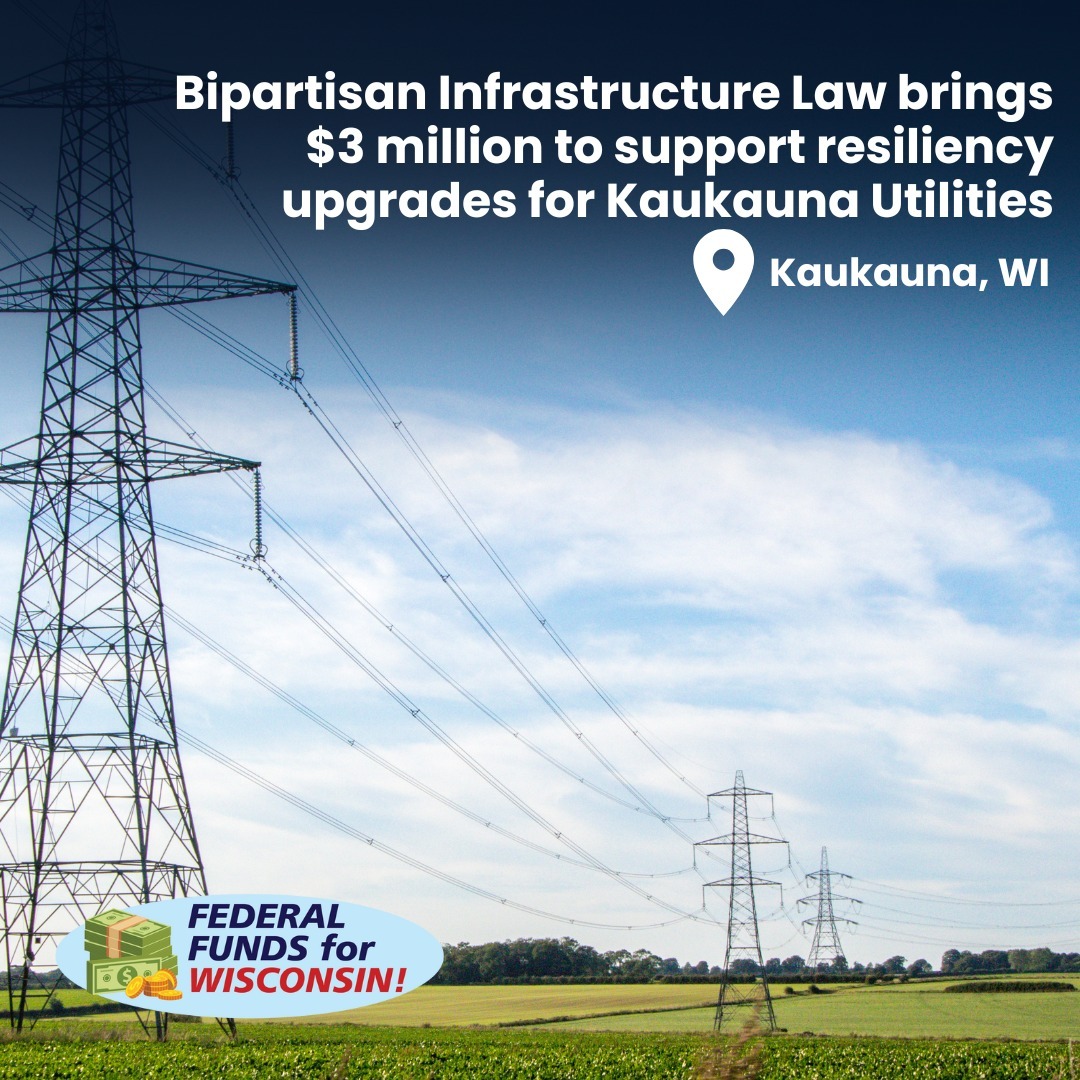
IMPROVING GRID RESILIENCE: Kaukauna Utilities is getting $3 million from the new Bipartisan Infrastructure Law to upgrade energy infrastructure while keeping costs down for customers. The upgrades will improve grid reliability, which is increasingly important as extreme weather events threaten the infrastructure that helps power our communities!
Kaukauna Utilities also plans to use the funds to invest in battery storage and microgrid projects.
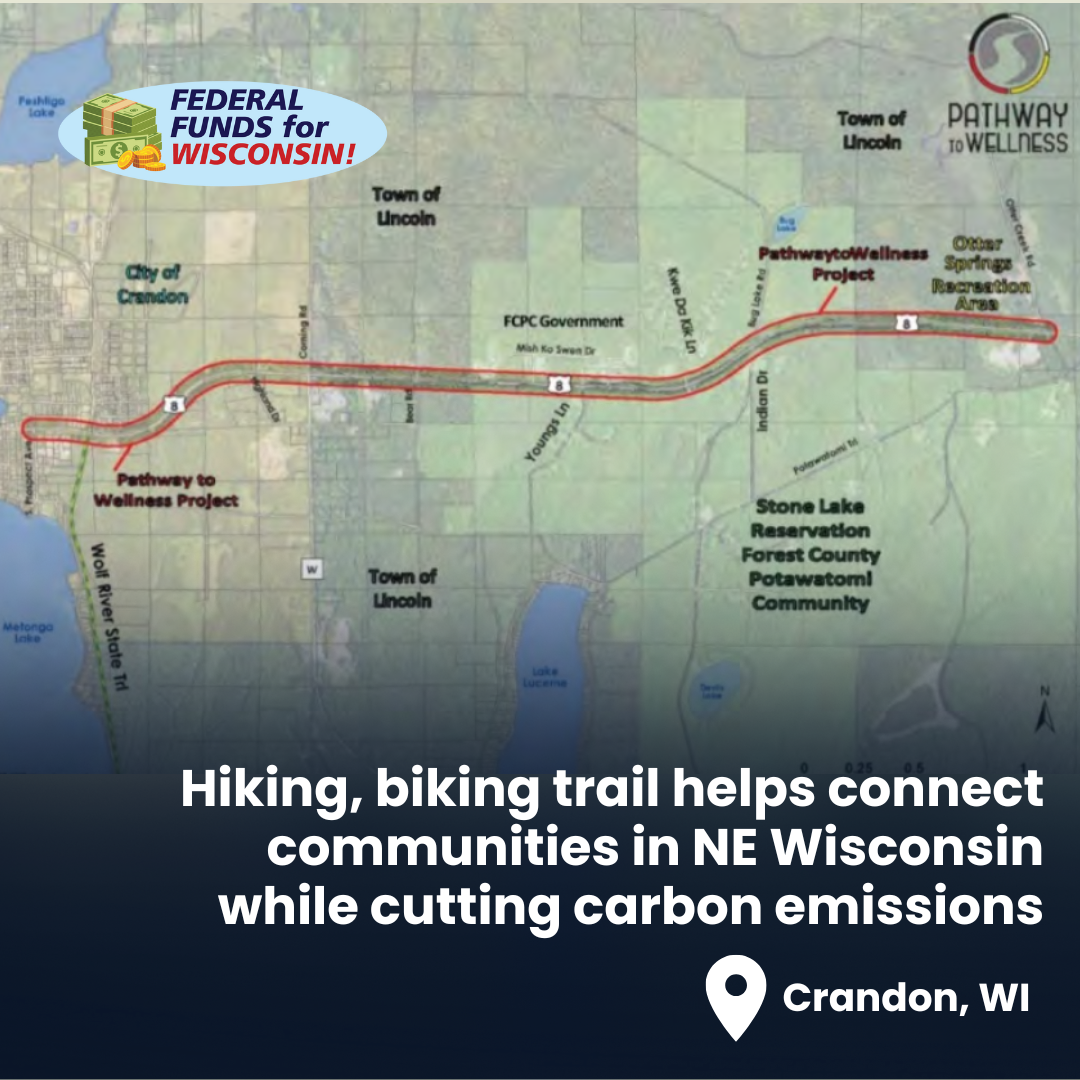
CONNECTING COMMUNITIES: A nearly 5-mile walking and biking path along U.S. Highway 8 will soon connect the Forest County Potawatomi Community (@fcpotawatomi) and City of Crandon thanks to more than $9.5 million in federal funding from the Biden Administration’s Bipartisan Infrastructure Law.
Once completed, the path will give area residents an easy, accessible way to local recreation areas that were previously only reachable by car, while also helping to reduce carbon emissions in the area!
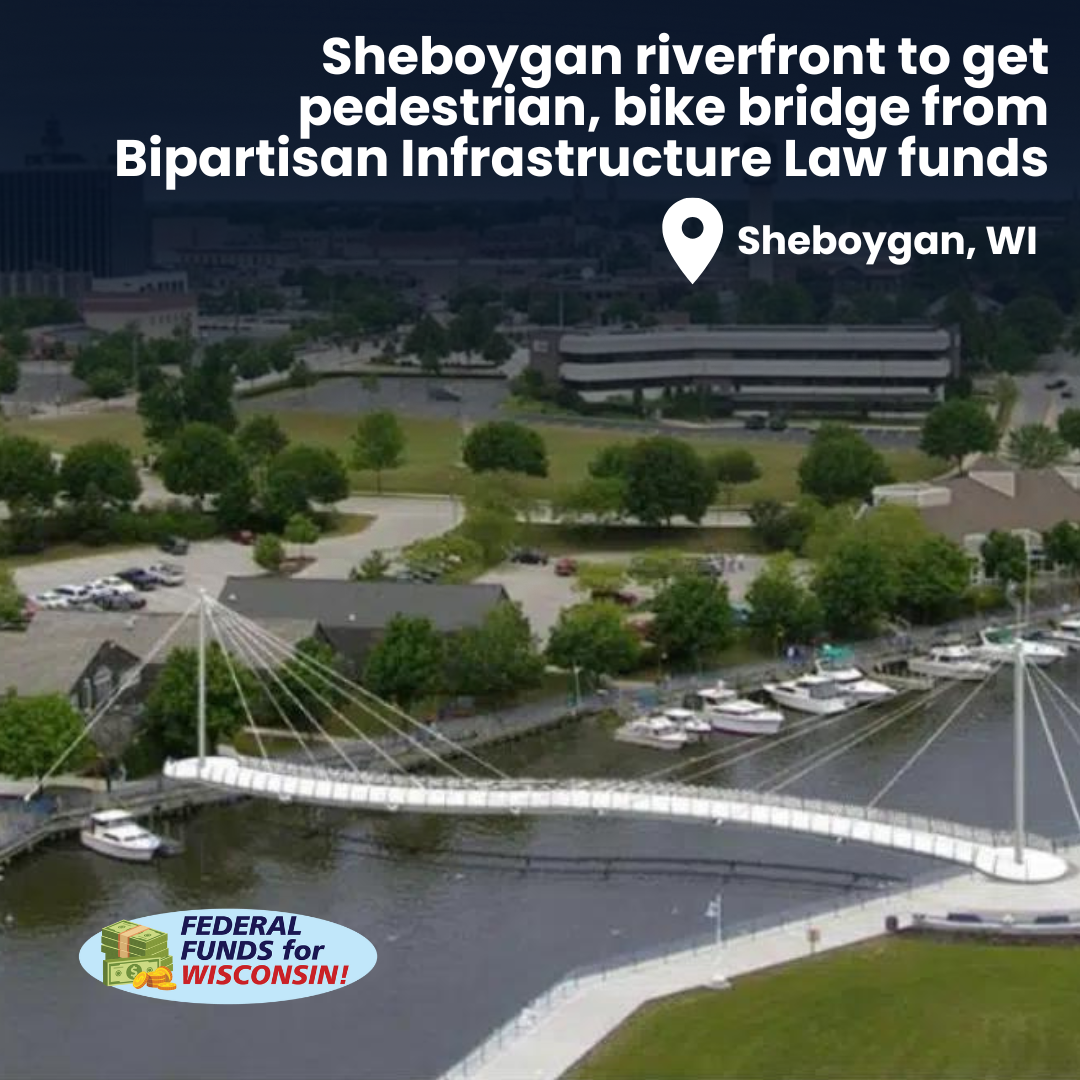
The City of Sheboygan is getting a new pedestrian and bicycle bridge thanks to $5.3 million in funds from the Biden Administration’s Bipartisan Infrastructure Law!
The project will connect two parts of the city’s downtown area, making it easier for visitors to walk and bike in the area while reducing emissions. Planning for the bridge has been in the works for 15 years and is now finally possible because of BIL funding.
Construction is expected to begin this year with the bridge being completed in 2026.

EXTRA FUNDS FOR EV CHARGING: The Potawatomi Fireside Market in Crandon and Oneida Casino in Green Bay — both of which are run by tribal nations — are getting more than $800K in combined funds to install electric vehicle charging systems. Funding for these new chargers comes from the National Electric Vehicle Infrastructure (NEVI) Program, which will make EV charging accessible for people living in rural areas.
Gov. Tony Evers announced funding for 51 other projects in late May just months after he signed legislation that made Wisconsin eligible for $78 million in federal funds made possible by the Bipartisan Infrastructure Law!

LEAVING LEAD PIPES BEHIND: The Biden Administration’s Bipartisan Infrastructure Law is bringing $83 million in funds to Wisconsin to replace lead service lines around the state, including 5,000 lead pipes in Kenosha.
Lead poisoning is 100% preventable, and this funding will help ensure Wisconsinites can trust the water coming out of their sinks for generations to come.
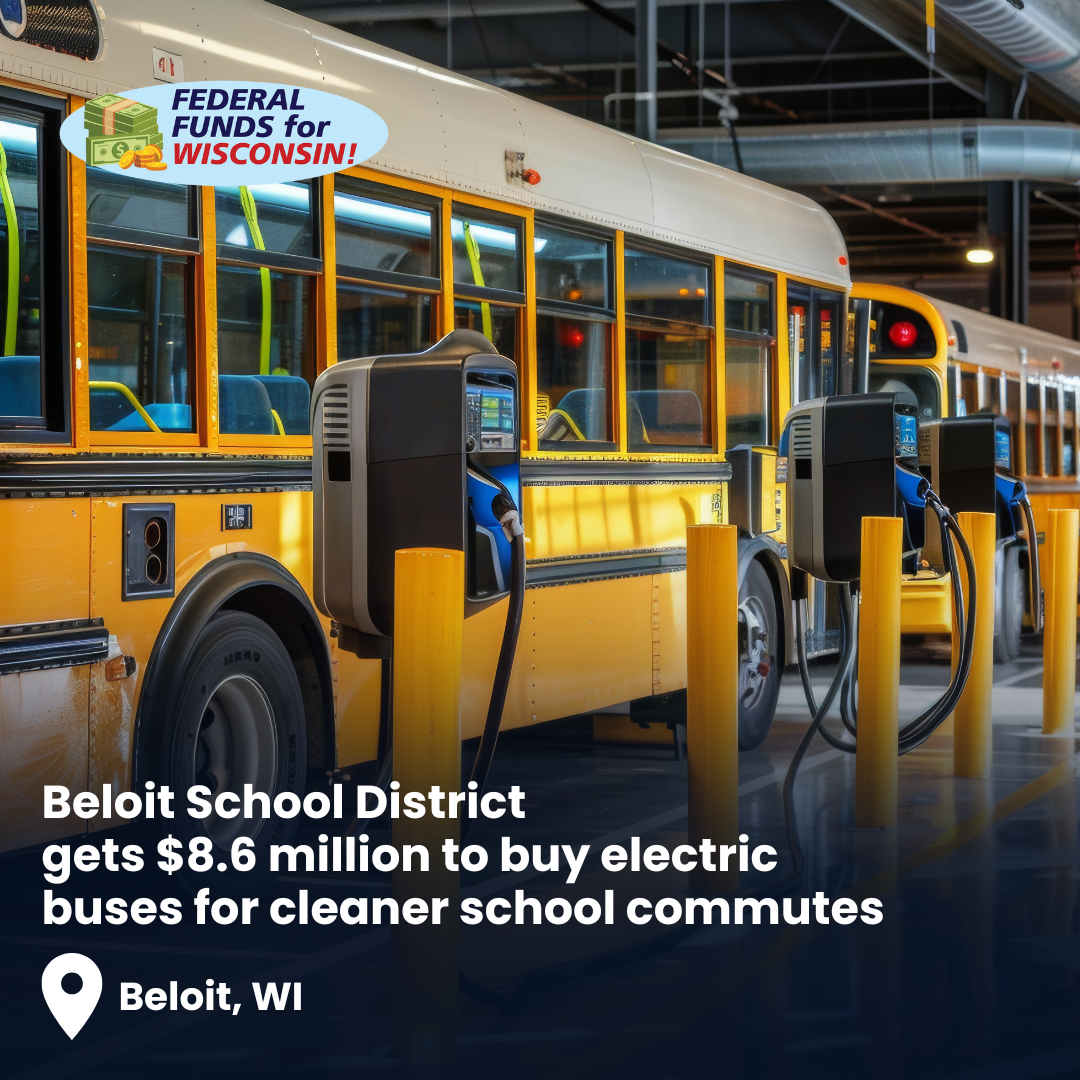
CLEANING UP THE COMMUTE: The Beloit School District is getting more than $8.6 million to buy 25 electric school buses, which will help cut carbon emissions and clean up the air where kids live and learn! Forty school districts around the state will split a total of $35 million to replace 131 gas buses with clean, electric alternatives. Money for these cleaner buses will come from the EPA’s Clean School Bus Program, which is funded by the Biden Administration’s Bipartisan Infrastructure Law.
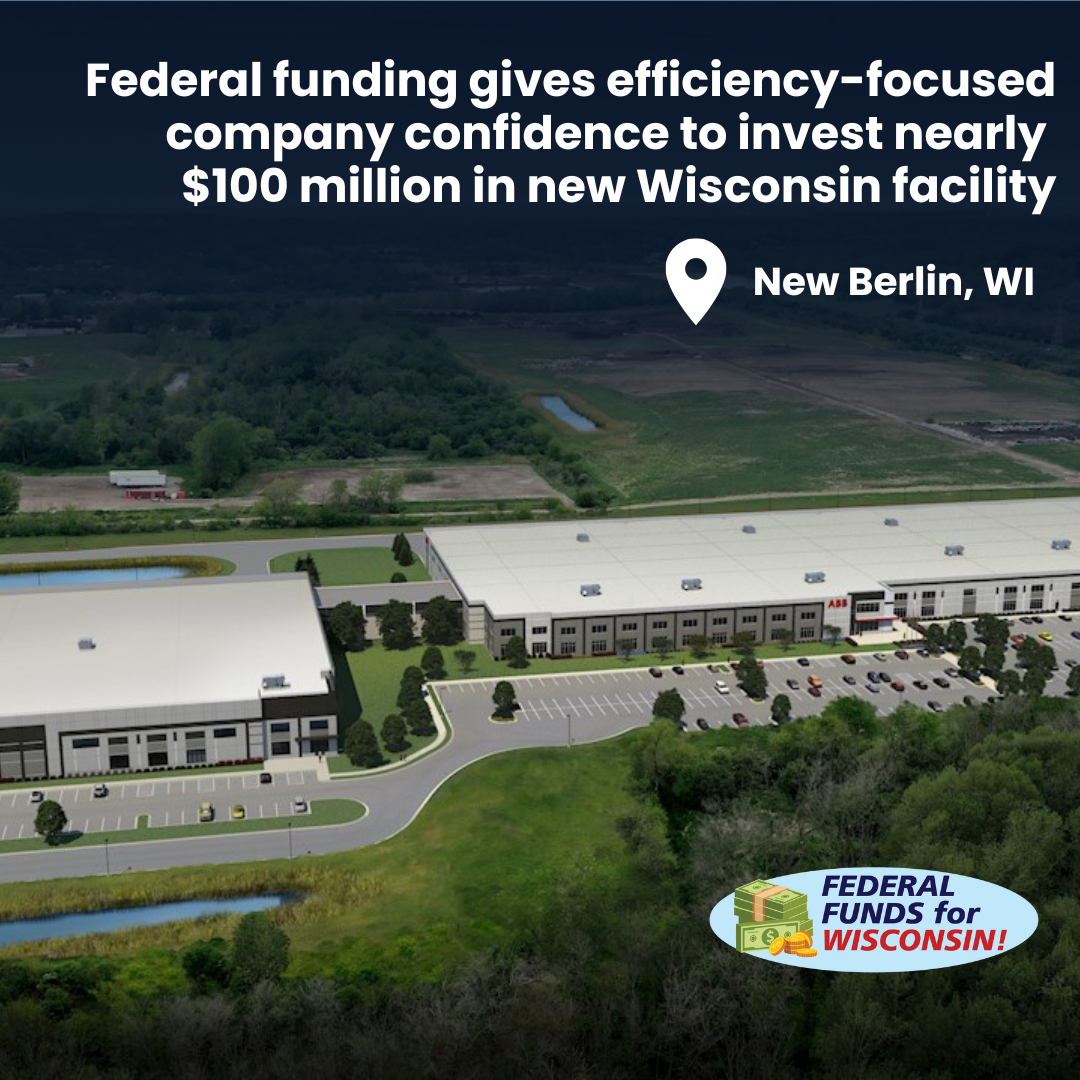
WIN FOR WISCONSIN: ABB (@abbnorthamerica), a manufacturing company that creates systems to help reduce energy consumption in buildings, is investing $100 million in a new facility located in New Berlin, Wisconsin. The facility is expected to create 100 new jobs and will open later this year. Company leaders said the Biden Administration’s Inflation Reduction Act gave them the confidence to invest in Wisconsin!
“Geothermal heat pump and modern HVAC systems will allow us to recycle wasted heat and reduce our energy usage by more than 45%. Improved insulation, rooftop solar panels, and ABB advanced building controls will also ensure that our campus operates efficiently and sustainably over the long-term.” — Kelly Kling, Site Leader and Vice President of Finance for the U.S. ABB Drives and Motion Services businesses

The Biden Administration’s Bipartisan Infrastructure Law is bringing $24.1 MILLION in new funding to help expand clean energy in Wisconsin’s tribal and rural communities!
The Bad River Band of Lake Superior Tribe of Chippewa, The Red Cliff Band of Lake Superior Chippewa and Bayfield County will use these BIL funds to help build micro-grids that will lower energy costs and support clean energy workforce development. Investments in micro-grids and battery storage systems will also make remote communities near the shores of Lake Superior more resilient during extreme weather events!
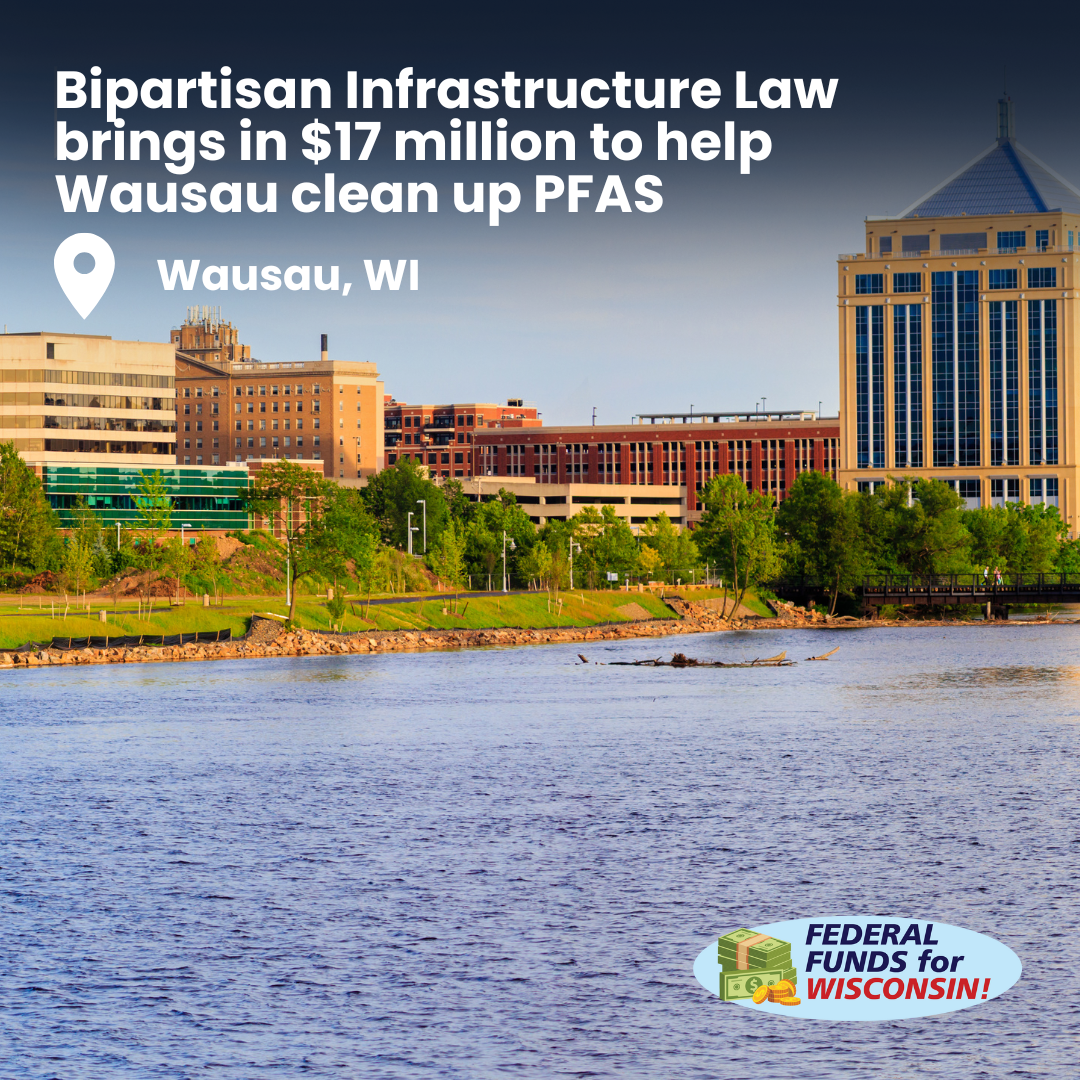
The Biden Administration’s Bipartisan Infrastructure Law means safer drinking water for Wisconsinites!
The City of Wausau is using $17 million in federal funds to build a new water treatment system that will reduce concentrations of toxic #PFAS “forever” chemicals in the city’s drinking water. Across Wisconsin, over 100 cities and towns will receive $402 million to build water infrastructure projects that will help ensure our communities have clean and safe water from the tap.
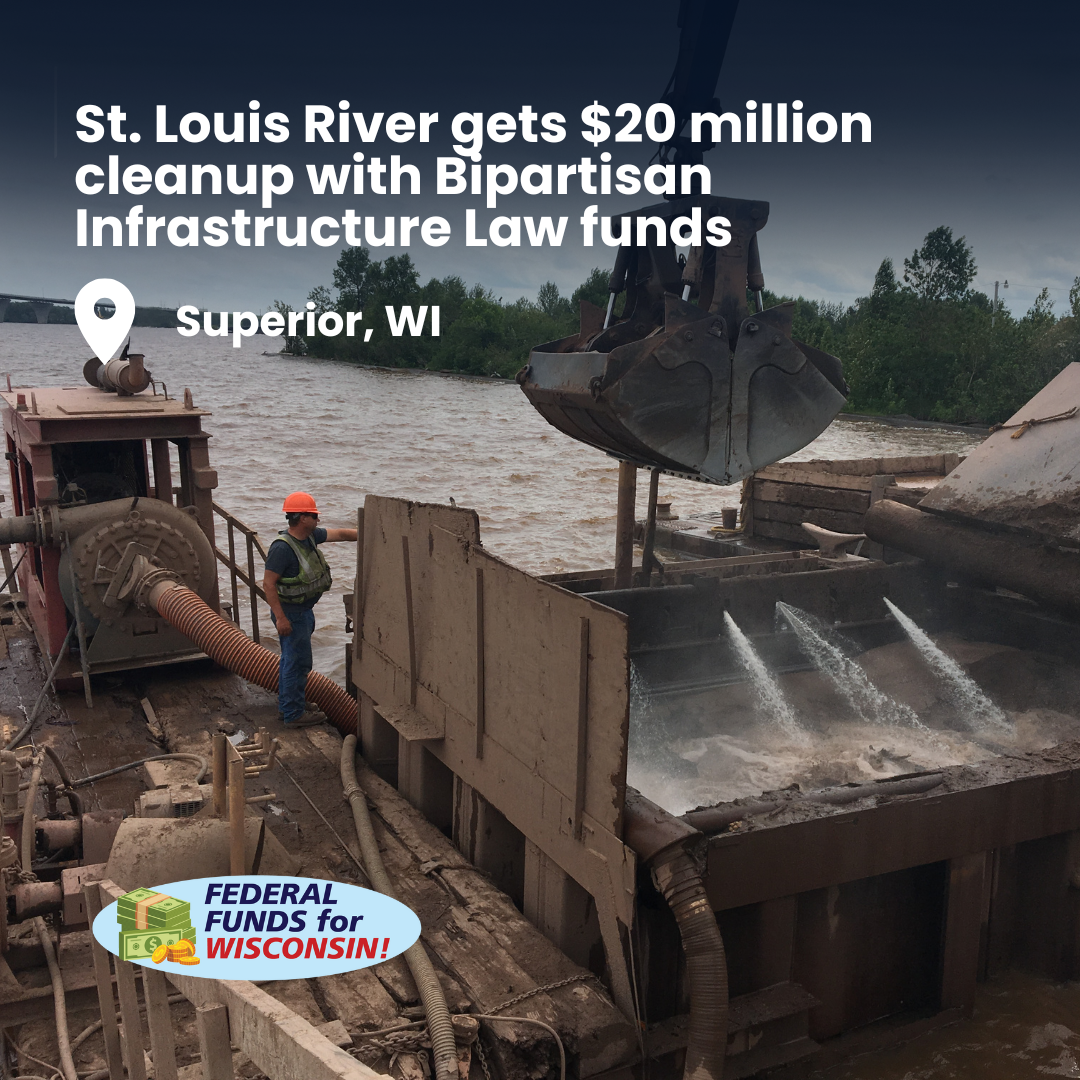
The St. Louis River is recently got a much-needed cleanup thanks to a joint effort by the Environmental Protection Agency, Wisconsin DNR and Minnesota Pollution Control Agency and more than $20 million in funds from the Biden Administration’s Bipartisan Infrastructure Law!
Over the past two years, crews worked to remove roughly 100,000 cubic yards of contaminated sediment from the St. Louis River Area of Concern, which includes parts of Minnesota and Wisconsin south of Superior/Duluth. Workers also removed invasive species, installed natural, native plants and restored crucial fish spawning areas. The St. Louis River is the largest tributary to Lake Superior, and the second largest Area of Concern (AOC) in the country, which makes supporting its health and wildlife even more important!
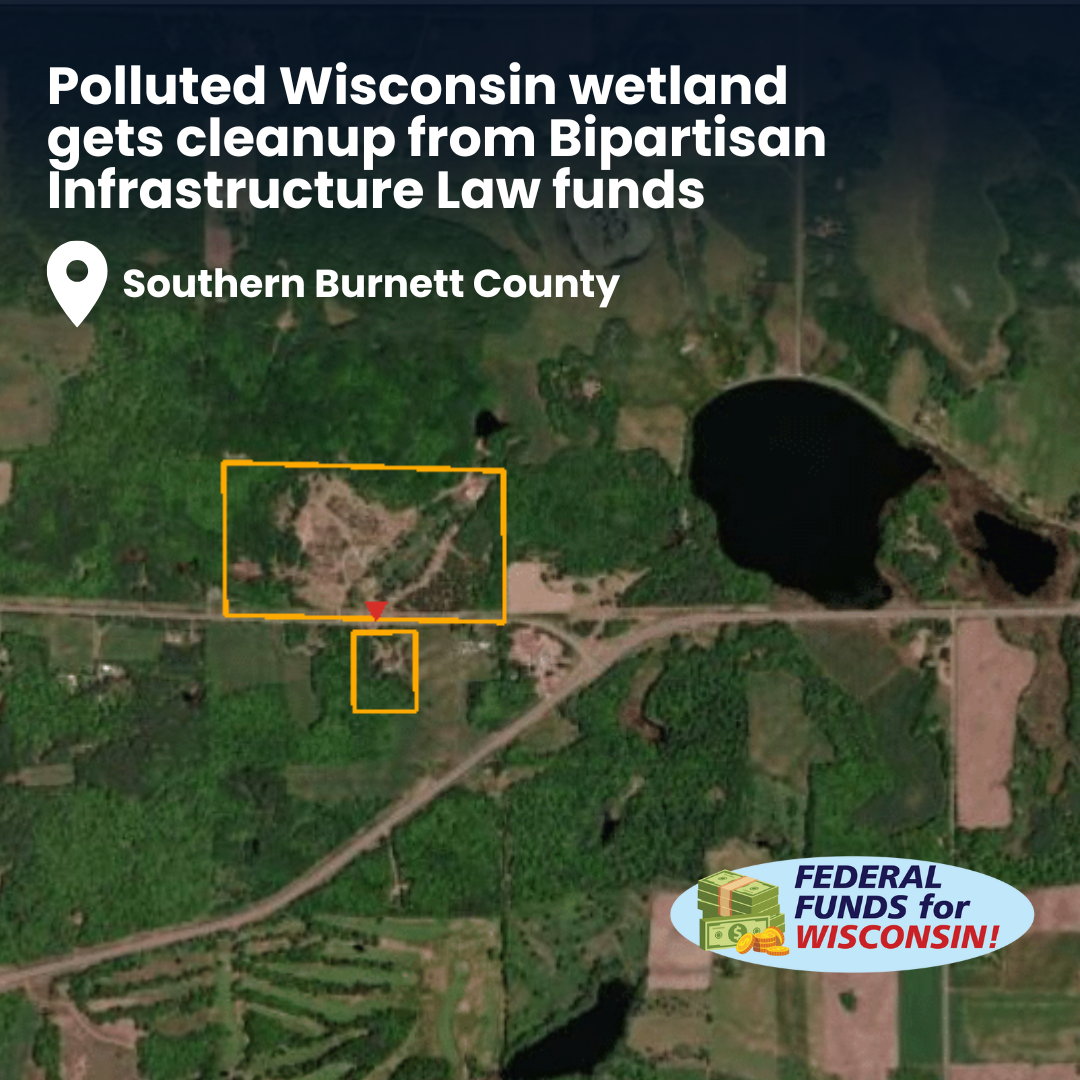
WISCONSIN WETLAND CLEANUP: $1.3 million in funds from the Biden Administration’s Bipartisan Infrastructure Law is helping to clean up a wetland area in northwestern Wisconsin decades after a wood treatment facility polluted the area and groundwater with toxic chemicals.
The Environmental Protection Agency (@epagov) finished an initial cleanup of the Penta Wood Products site in Burnett County in 2000, but soil testing by the Wisconsin Department of Natural Resources (@wi_dnr) in 2017 revealed there was more work to do. Now, the Biden Administration is taking important steps to protect the land and people who live nearby!
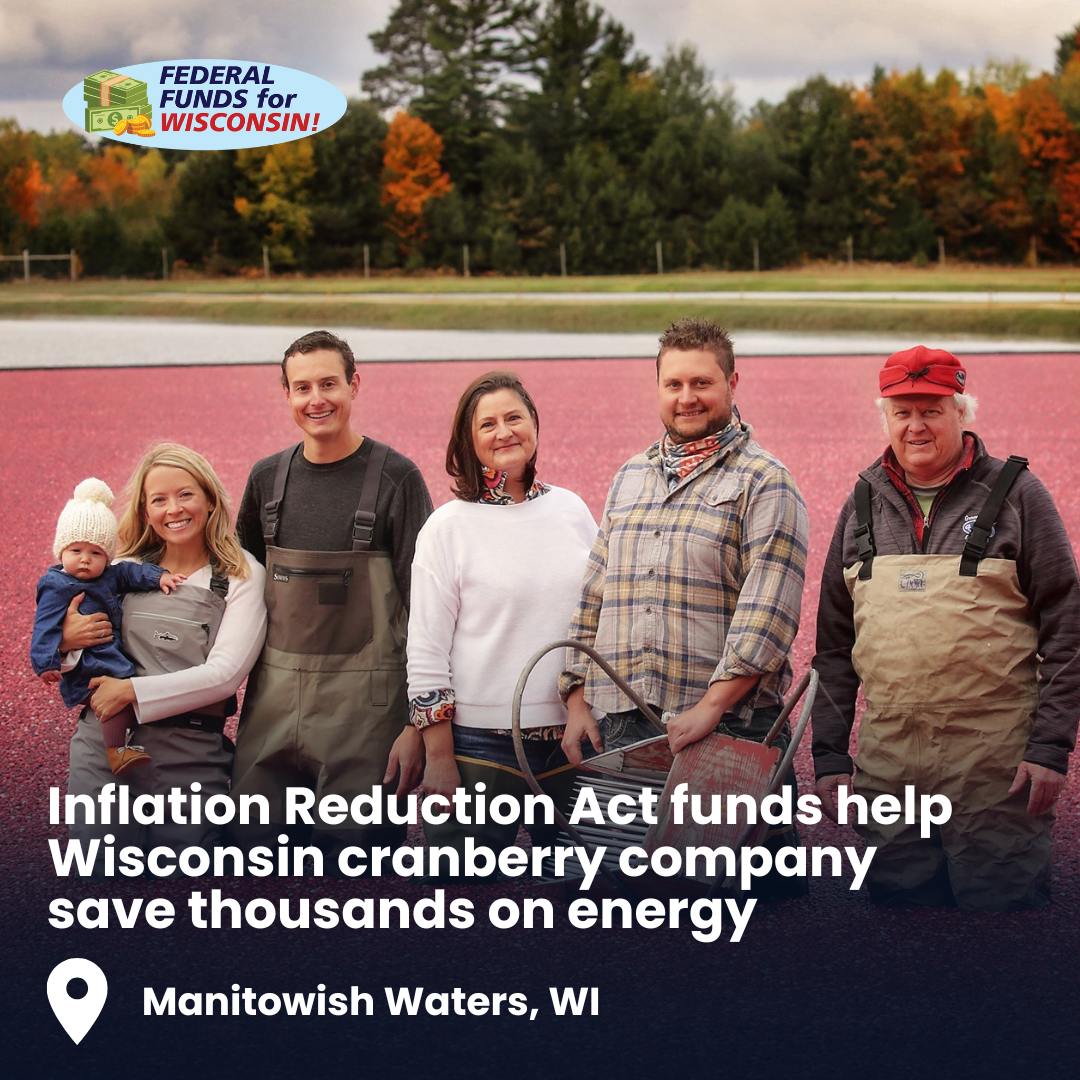
INCREASING IRRIGATION EFFICIENCY: Bartling’s Manitowish Cranberry Company is taking advantage of a $77,582 grant from the Biden Administration’s Inflation Reduction Act to install more energy-efficient electric irrigation pumps to grow more of Wisconsin’s treasured state fruit. The new pumps are expected to cut their annual energy use by 72% and help them save thousands of dollars each year!
“This is an investment in the future of our business, helping us move away from fossil fuels. We expect to save about $5,000 a year, on top of the avoided cost of fuel we are not burning.” – David Bartling, Owner
📷: Bartling’s Manitowish Cranberry Company
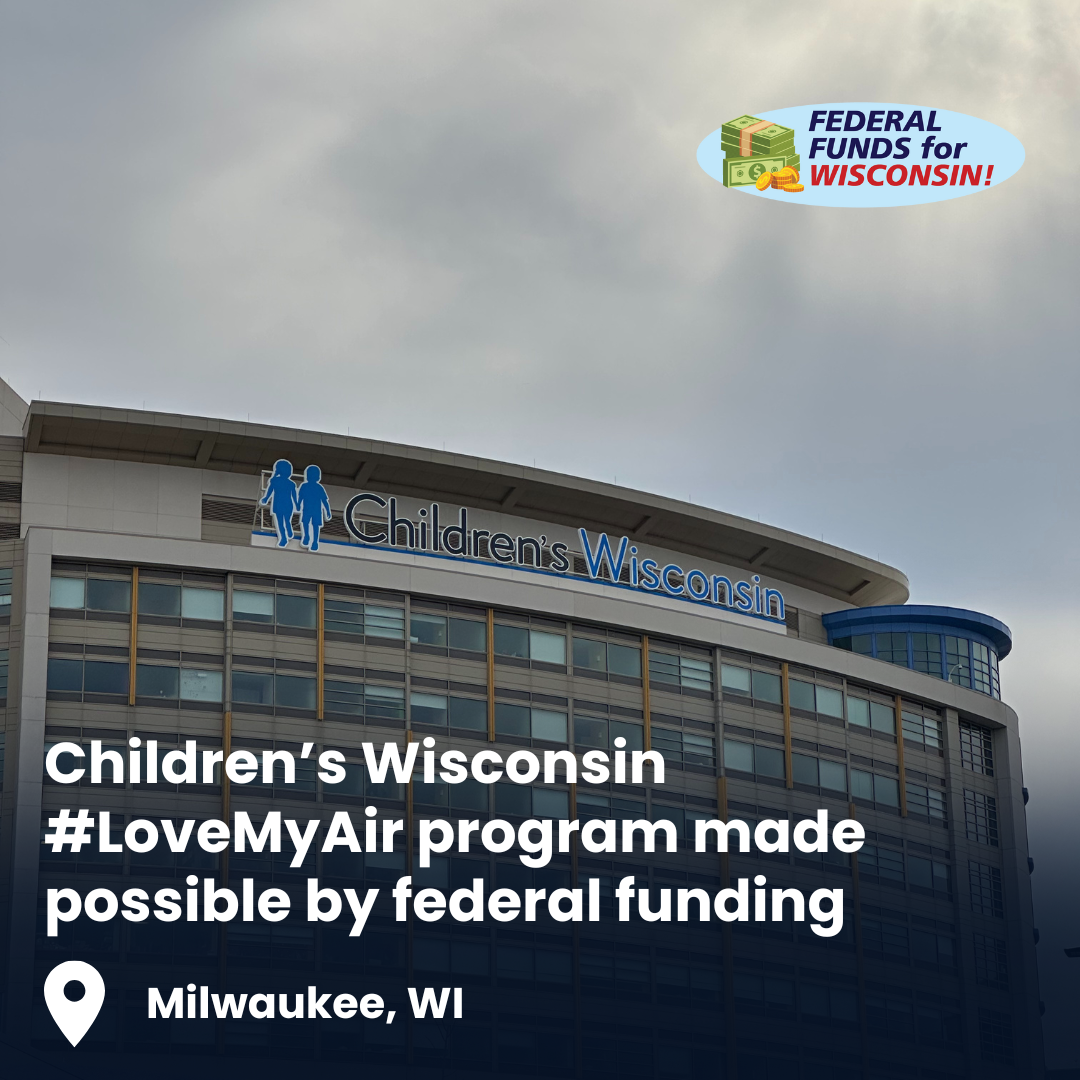
Funding from the Inflation Reduction Act (IRA) means healthier kids & communities in Wisconsin!
Children’s Wisconsin is working to track air quality in Milwaukee neighborhoods and near schools that face a higher asthma burden. The #LoveMyAir program, which aims to inform vulnerable communities about the risks of air pollutants to children’s health, is funded by $500,000 from the IRA. The City of Madison and the Wisconsin DNR also received nearly $1 MILLION in combined funds to do similar work in other vulnerable communities!
Pollution that’s invisible to the naked eye can cause serious health issues including asthma, decreased lung function and lung disease. Kids are especially vulnerable to these threats, which is why air quality testing is so important, especially in communities located near dirty power plants. Everyone deserves clean air!

Did you know there’s an endangered rattlesnake that calls western Wisconsin home? The Eastern Massasauga snake, which lives in the floodplain where the Chippewa and Black rivers meet, is threatened by flooding that’s made more common by climate change. Luckily, Wisconsin is getting $500,000 in funding from the Biden Administration’s Inflation Reduction Act to help mitigate flooding and protect the endangered species and its habitat!
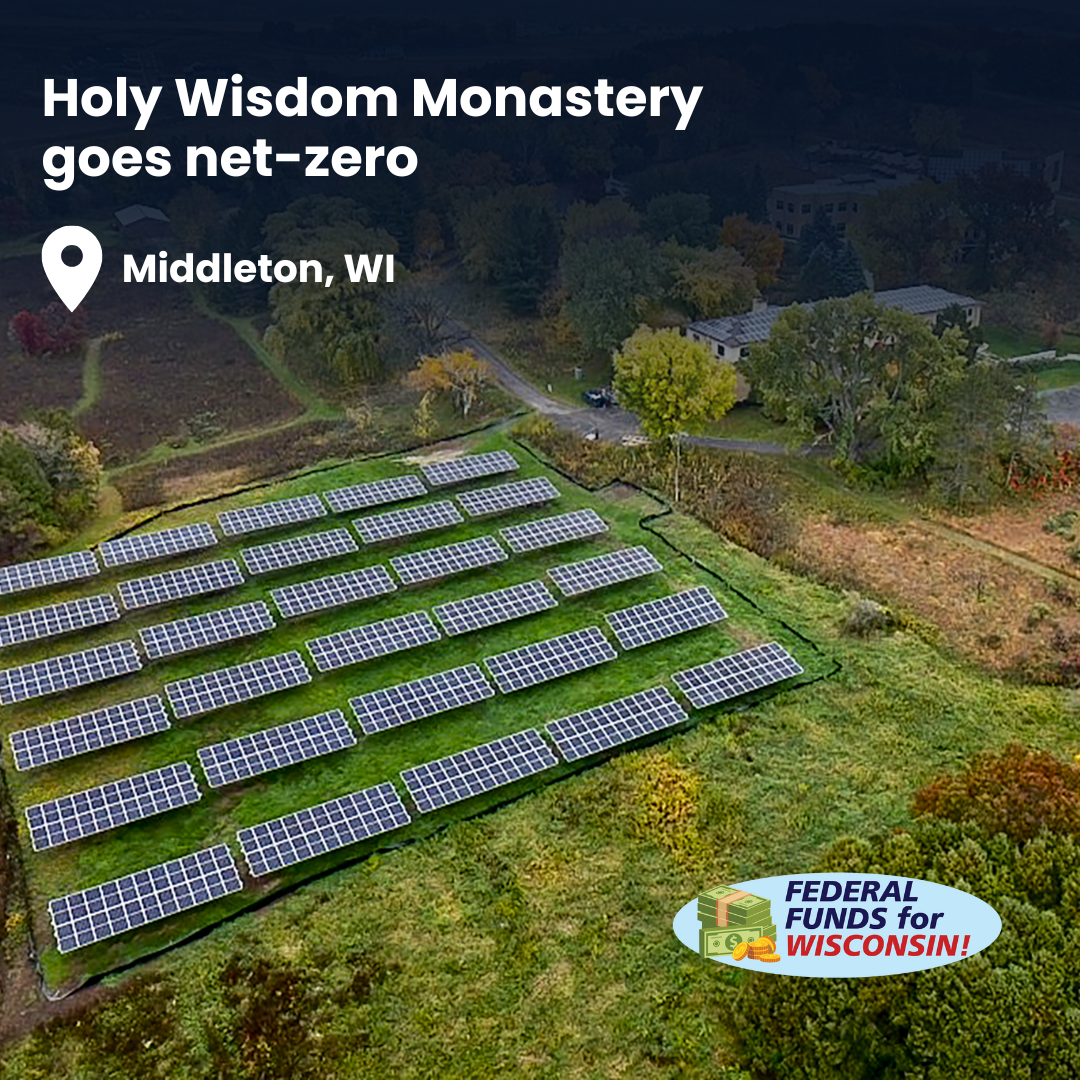
Thanks to an estimated $1 million in tax credits from the Inflation Reduction Act, Holy Wisdom Monastery expects to eliminate or offset all of their carbon emissions by the end of 2024. The monastery sits on over 130 acres near Middleton, WI.
This transition is just one of many ongoing initiatives at the monastery to create a more sustainable future for all!
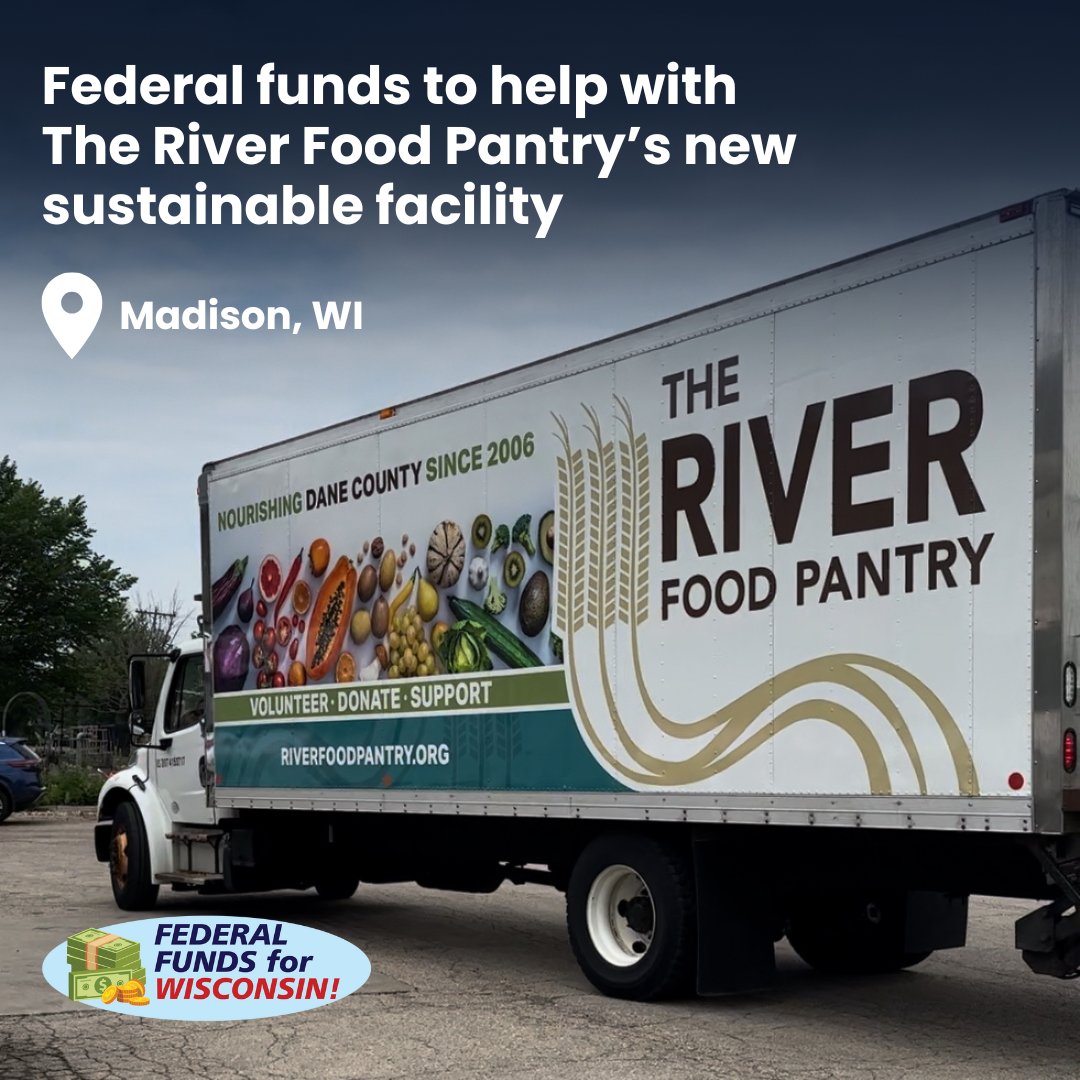
After nearly 20 years of serving the Madison community from an old warehouse, The River Food Pantry is planning to build a brand-new, more sustainable facility that will fit its needs for decades to come.
Funds from the Inflation Reduction Act will help cover up to 40% of the cost for a rooftop solar array and geothermal heating system that will make the new building cleaner and less reliant on fossil fuel energy sources. Plans for the new building also include one of Dane County’s first fully electric commercial kitchens, electric vehicle charging stations and more efficient appliances!
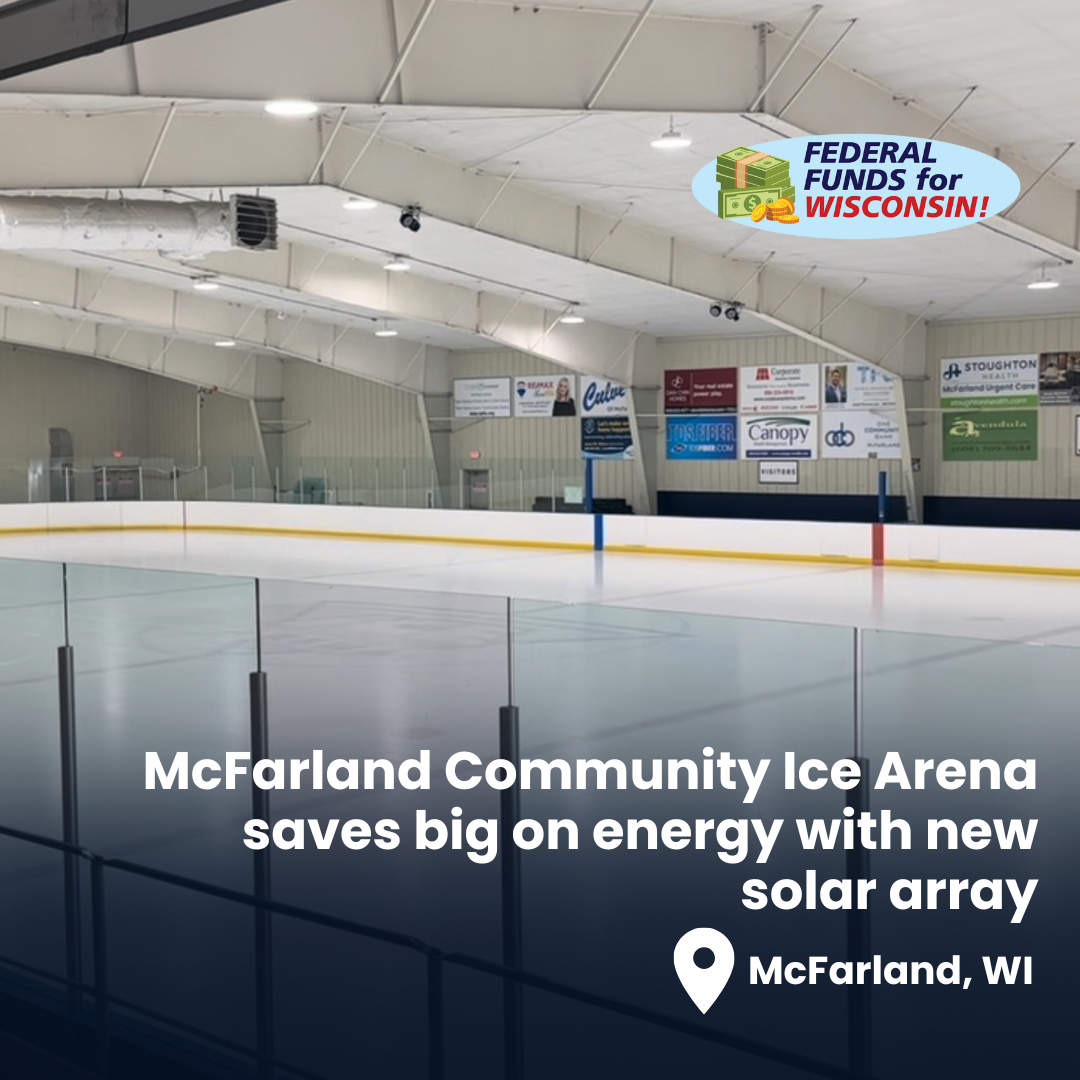
The McFarland Community Ice Arena is going solar! SunPeak Solar installed 600 rooftop panels that will save the arena **$29,000** a year in energy costs. Incentives from the Inflation Reduction Act make it possible for nonprofits like the ice arena to take advantage of major cost savings for solar & other clean energy upgrades. Shout out to everyone involved in this great project, turning the energy from the sun into ice for kids across our community!
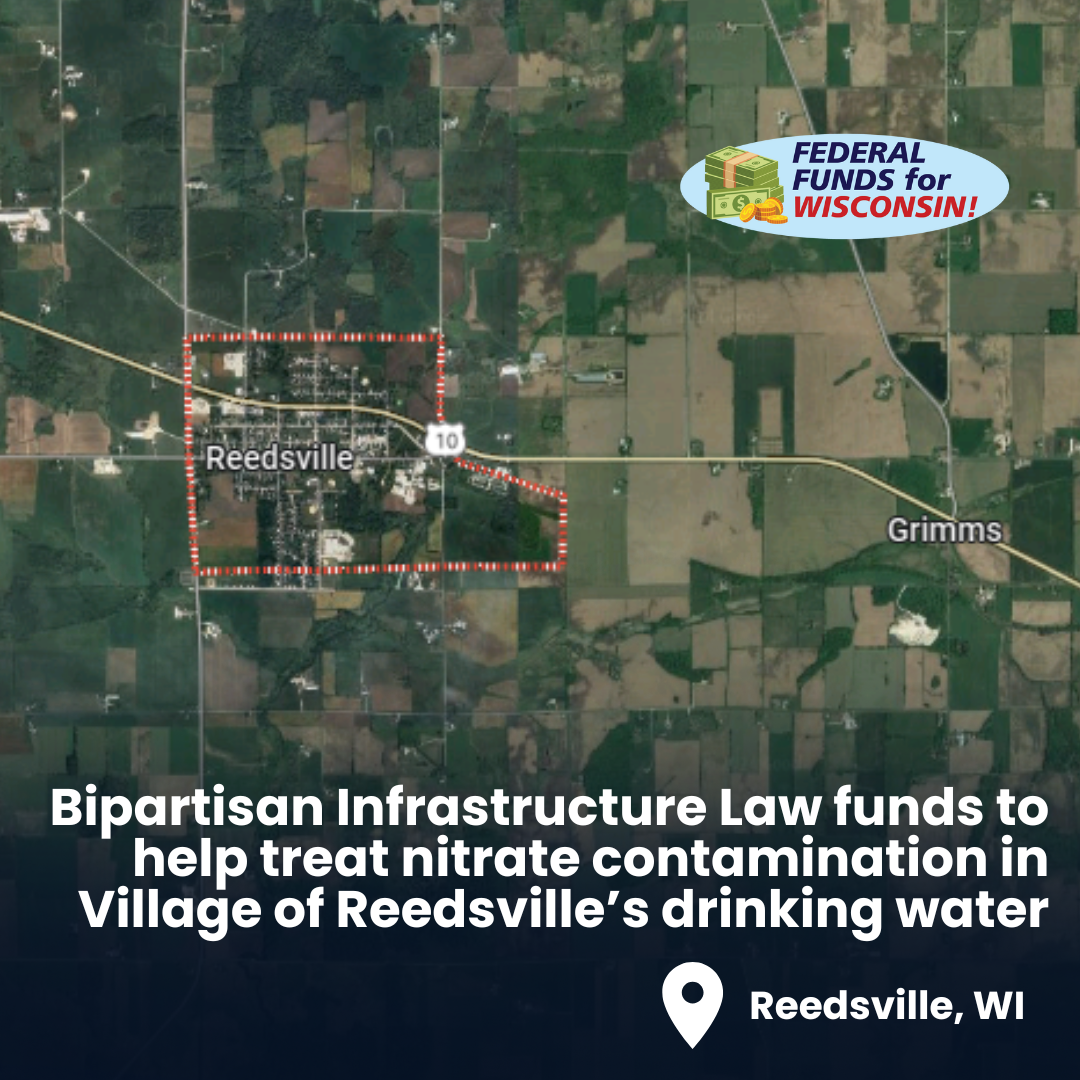
The Village of Reedsville is getting more than $3 million in funds from the Bipartisan Infrastructure Law to treat excess nitrates in the village’s drinking water. In agricultural states like Wisconsin, nitrogen in the form of fertilizer and manure is often used to promote crop growth, but overuse of these substances can cause nitrates to leach into our drinking water.
Estimates suggest 90% of groundwater nitrate contamination comes from agricultural sources. Nitrates are also the most common groundwater pollutant in Wisconsin and can pose significant health risks to everyone.
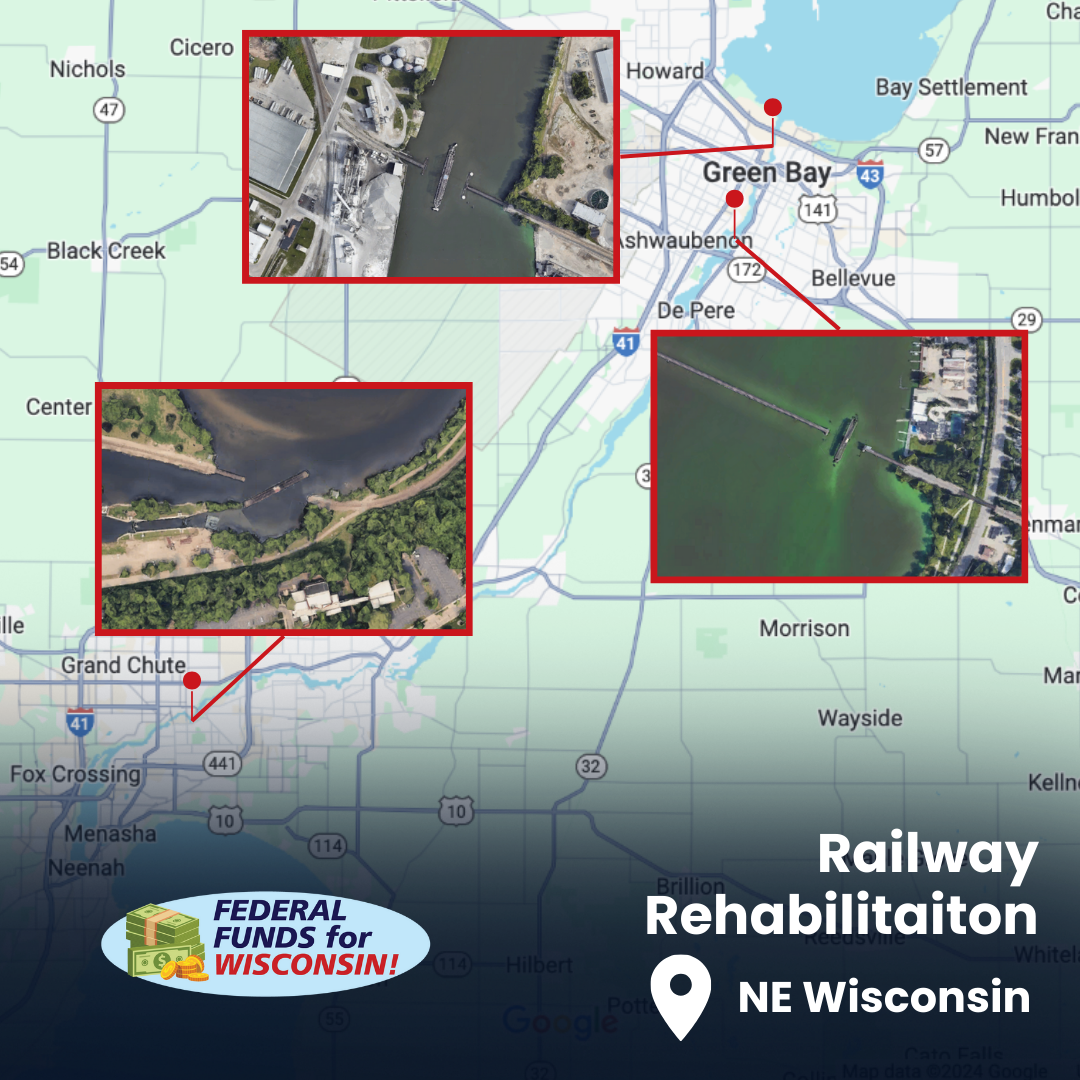
RAILWAY REHABILITATION: Three deteriorating railway swing bridges in Appleton and Green Bay will soon get major long-term sustainability upgrades thanks to funding from the Bipartisan Infrastructure Law. The rail system is getting $2.04 MILLION to plan for and design updates to these bridges, bringing increased economic activity to the Fox Valley area!
Transporting cargo by train emits far less carbon into the atmosphere compared to shipping by truck, but these bridges are regularly taken out of service because they’re nearly 100 years old. That puts reliable shipping to and from the area at risk.
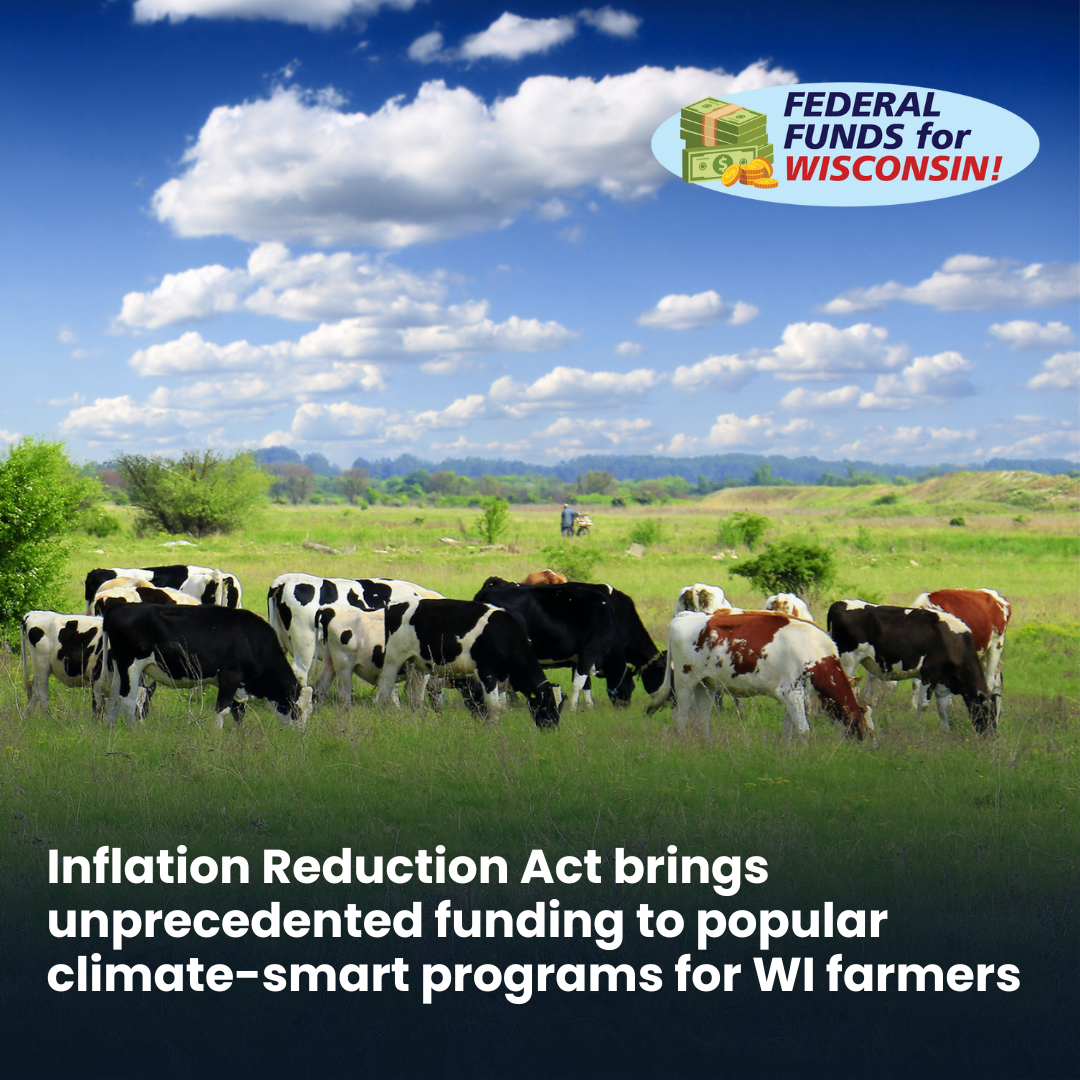
CLIMATE-SMART AG: More than $19.5 billion from the Inflation Reduction Act is helping the USDA provide more access to popular climate-smart agriculture programs. That money will help over 60,000 Wisconsin farms adopt agricultural practices that maintain soil health, mitigate water pollution and reduce greenhouse gas emissions, all while increasing efficiencies and bringing added financial benefits to those who take care of the land we call home!
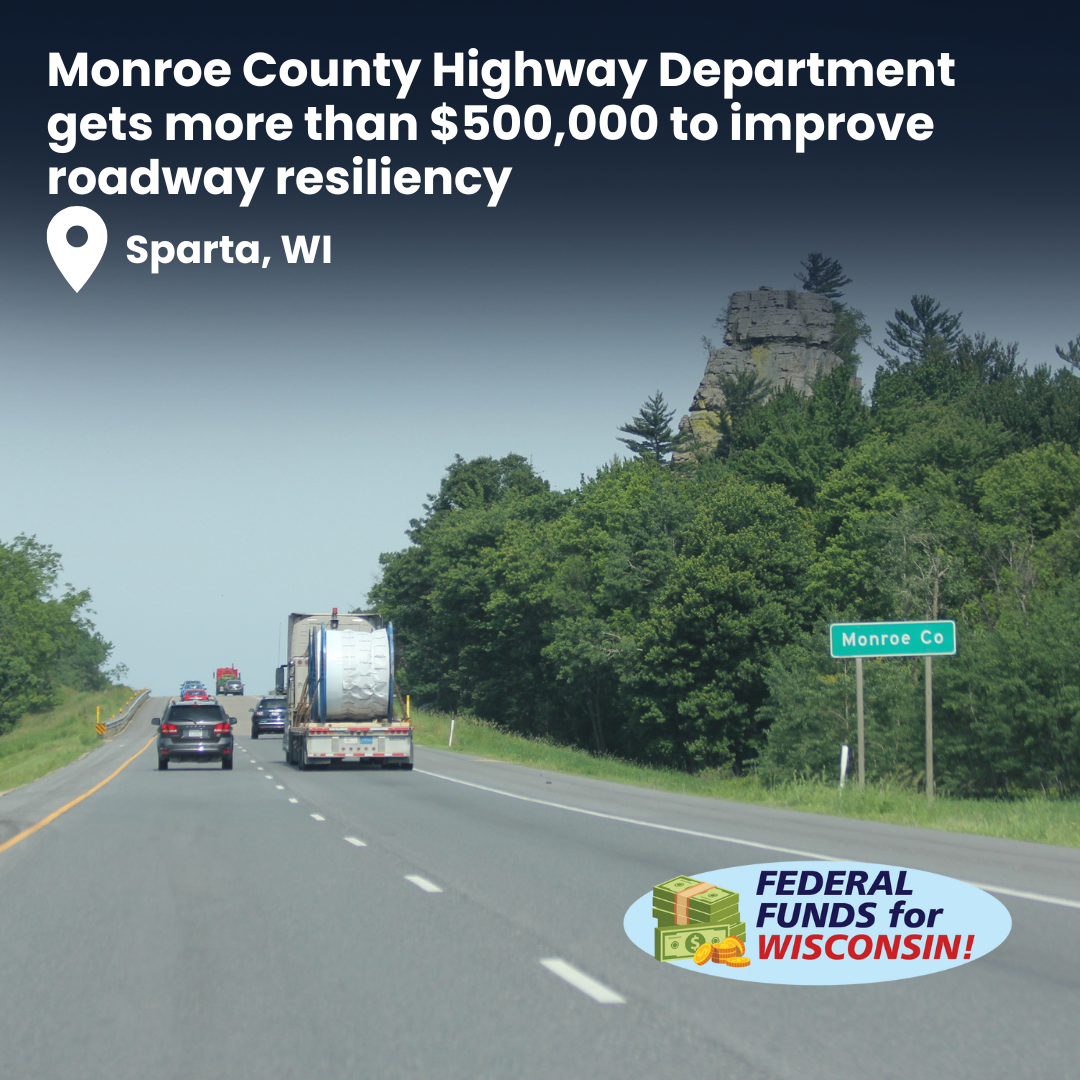
ROADWAY RESILIENCY: The Monroe County Highway Department is getting $506,000 from the Bipartisan Infrastructure Law to help plan for making the county’s bridges, dams and roadways more resilient to extreme weather events, which are made more common by climate change. Flash flooding from heavy rainfall events threatens Wisconsinites safety on the roadways, which makes this project so crucial!
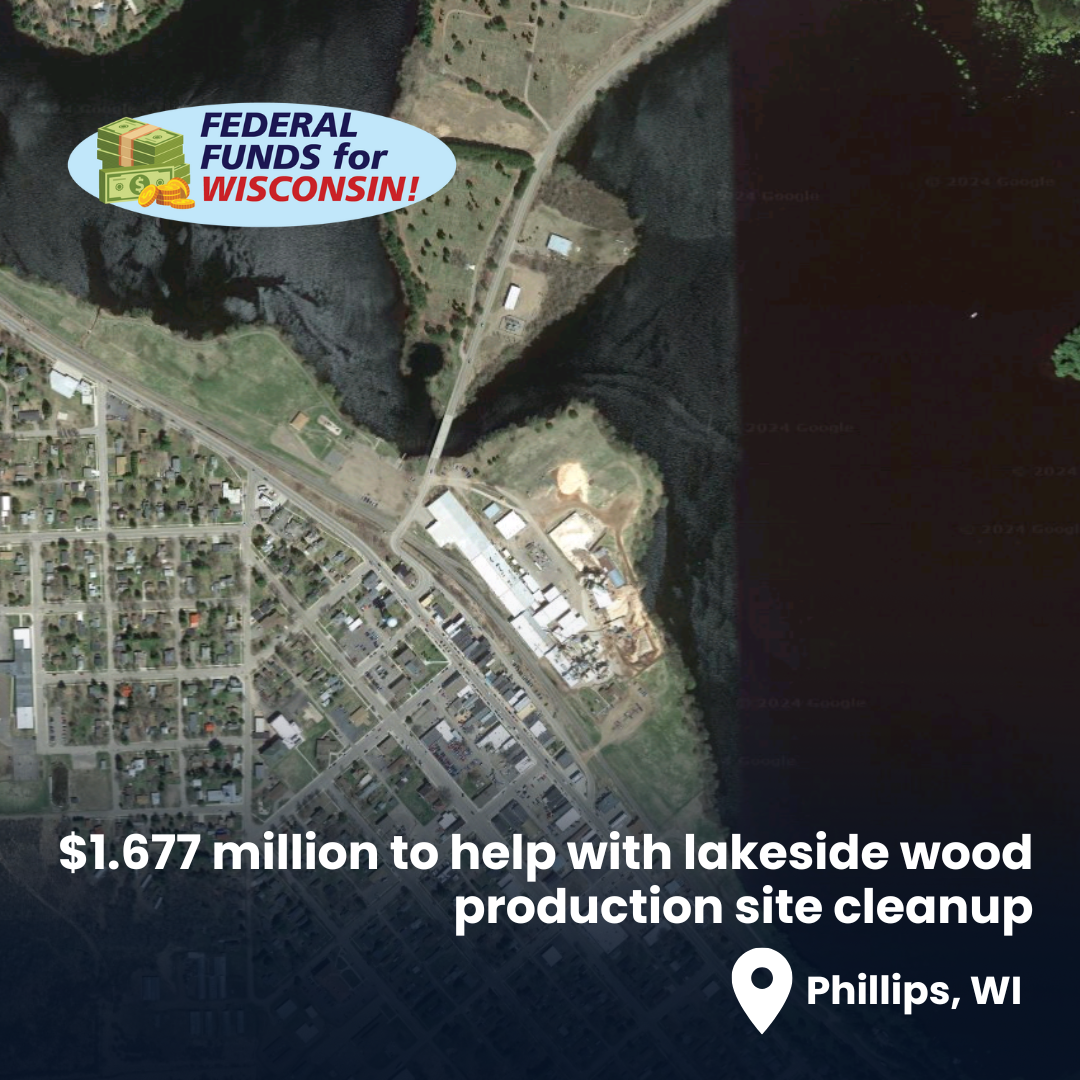
HEAVY METALS CLEANUP: A whopping $1,677,894 in EPA grant funds from the Bipartisan Infrastructure Law is going to Price County to clean up the former Lionite Mill property in Phillips, WI. Heavy metals and inorganic contaminants polluted the area over the course of the facility’s 130+ years of operation. The old wood products production facility dates back to 1883 and only just closed in 2015.
While the cleanup work is underway, Phillips residents have already started discussing ideas for transforming the site into one that’s usable for the entire community!
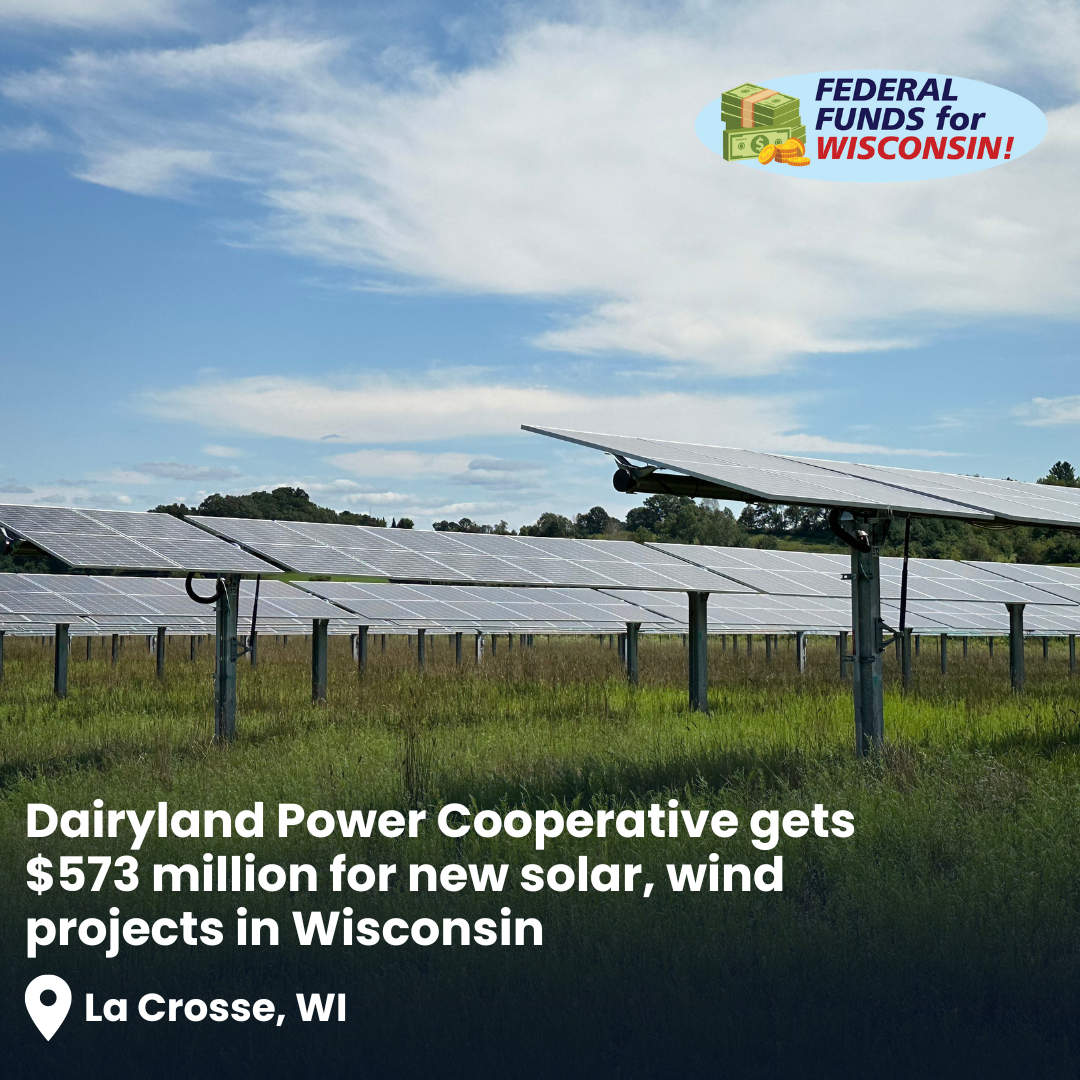
CLEAN ENERGY COMING SOON: Dairyland Power Cooperative is getting a whopping $573 million in funds from the Inflation Reduction Act to bring massive investments in clean energy to western Wisconsin! This funding will help Dairyland Power invest in solar and wind projects that will generate 1,080 megawatts of power — enough to power 800,000 homes.
Early estimates show these projects will cut energy costs for Dairyland Power customers by 42% over the next decade! These projects are also expected to reduce greenhouse gas emissions by 3 million tons a year, which is equivalent to taking 729,000 gas-powered cars off the road per year.
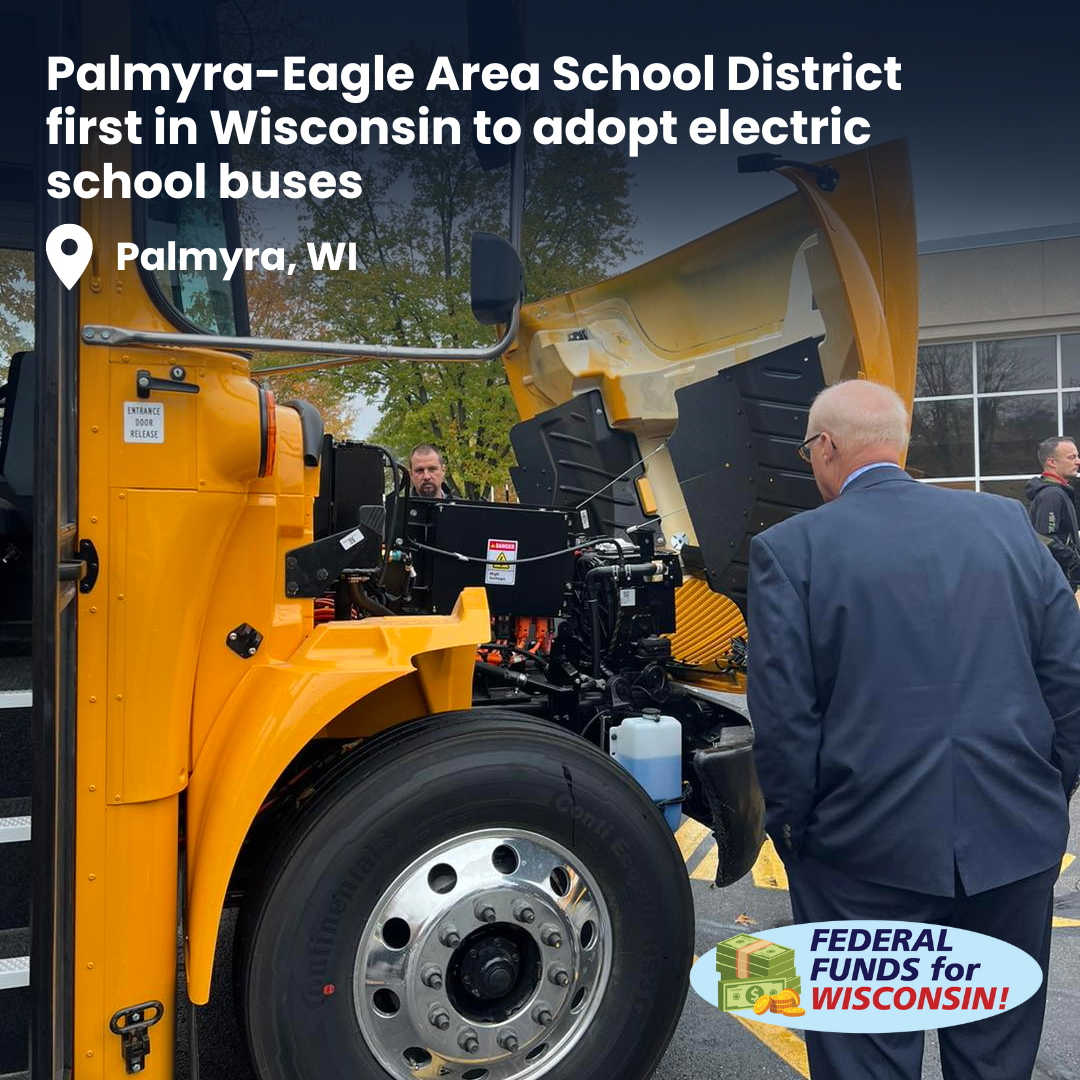
PALMYRA IS PLUGGED IN: After becoming the first school district in Wisconsin to electrify its entire school bus fleet last year, the Palmyra-Eagle Area School District’s first full academic year with these new buses is now underway!
The district received $2,370,000 from the Clean Bus Program, which is funded by the Bipartisan Infrastructure Law, to cover the cost of its six new buses and help pay for charging station installation. These electric buses will make the Palmyra and surrounding communities healthier while providing smoother and quieter rides for students! The school district also expects to save $50,000 – $60,000 on fuel costs per year.

SHADE FOR STEVENS POINT: Some of Stevens Point’s major roads will get a boost of shade for sidewalks and bus stops in the coming years from a $105,000 grant funded by the Inflation Reduction Act! The funds will help pay for an estimated 220 new shade and fruit trees in neighborhoods around the city. More trees along our streets means more shade and fresh air for pedestrians on hot days!
“I am extremely proud of our Forester and the forestry department. This grant will help provide the cooling, oxygen-producing wildlife habitat that all trees do, but we’ll have a component to help with food insecurity by putting fruit trees in areas that nearby residents can utilize.” – Steven’s Point Mayor Mike Wiza
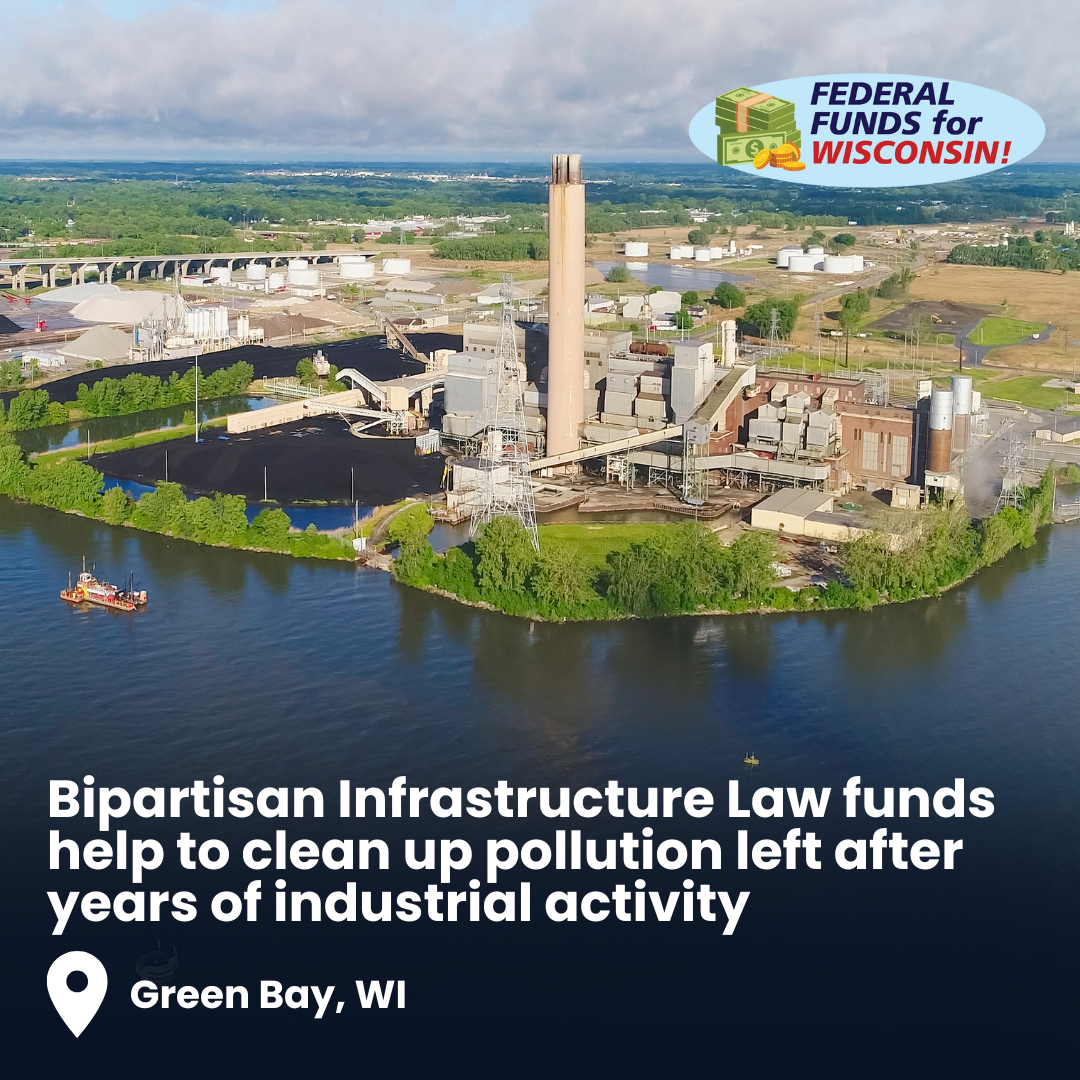
The Pulliam Power Plant, an industrial site along the Fox River at the Port of Green Bay is getting cleaned up and redeveloped thanks to funds from the Bipartisan Infrastructure Law! $10 million in federal funds will help remove and clean up coal piles, dredge contaminated sediments, fill an old slip and improve stormwater management.
Coal yards emerged along the Fox River in the 1880s and have remained a hazardous landmark ever since. Studies have shown that coal storage sites threaten human health within a 25-mile radius.
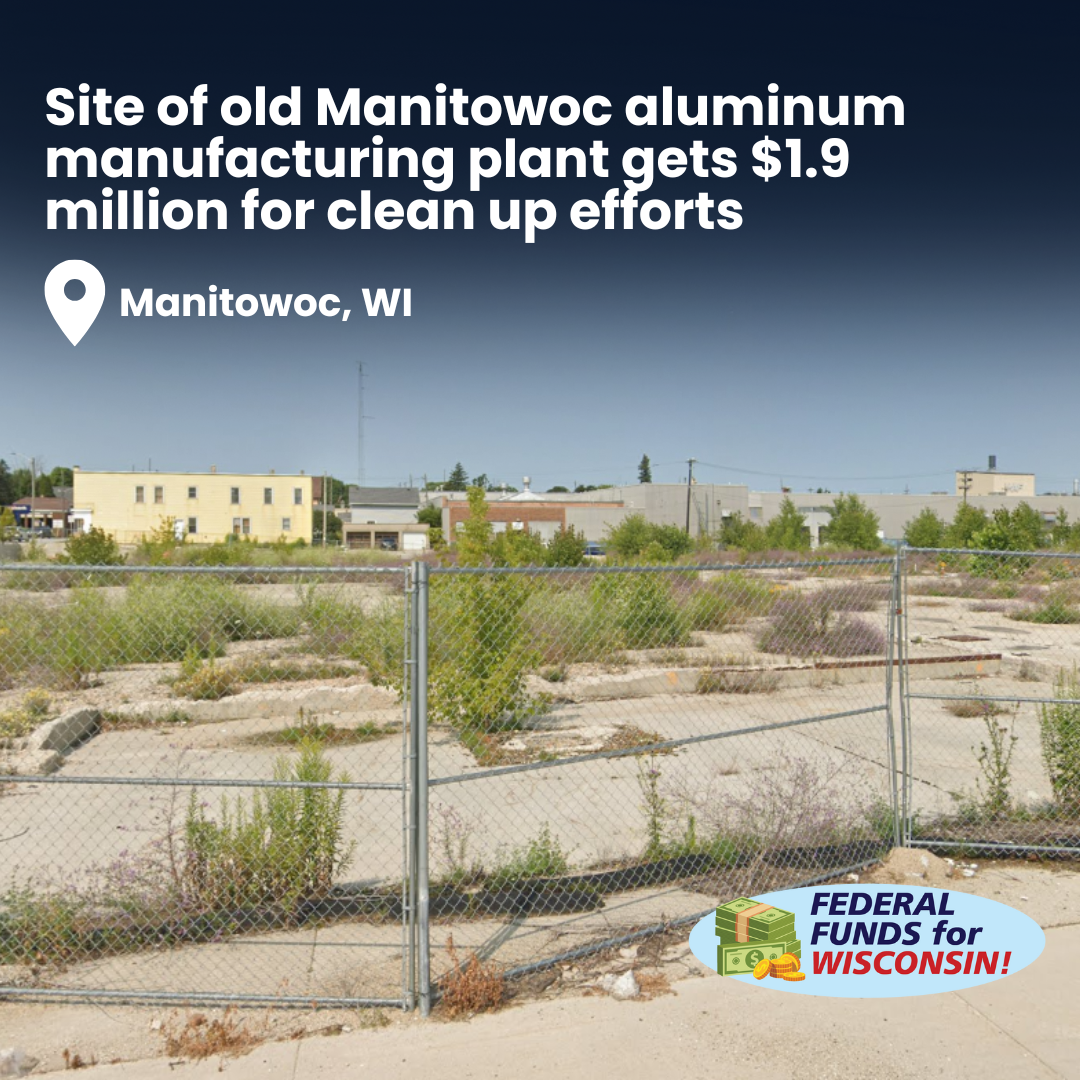
REMOVING HEAVY METALS FROM MANITOWOC: The City of Manitowoc received $1.9 MILLION from the Bipartisan Infrastructure Law to clean up heavy metals, PCBs and other hazardous compounds from a vacant site that used to be an aluminum manufacturing plant near the city’s downtown.
Cleaning up this site and another along the Manitowoc River that used to be home to railroad tracks and coal storage will help revitalize the city’s downtown area and make it a healthier place for Wisconsinites to live and visit!
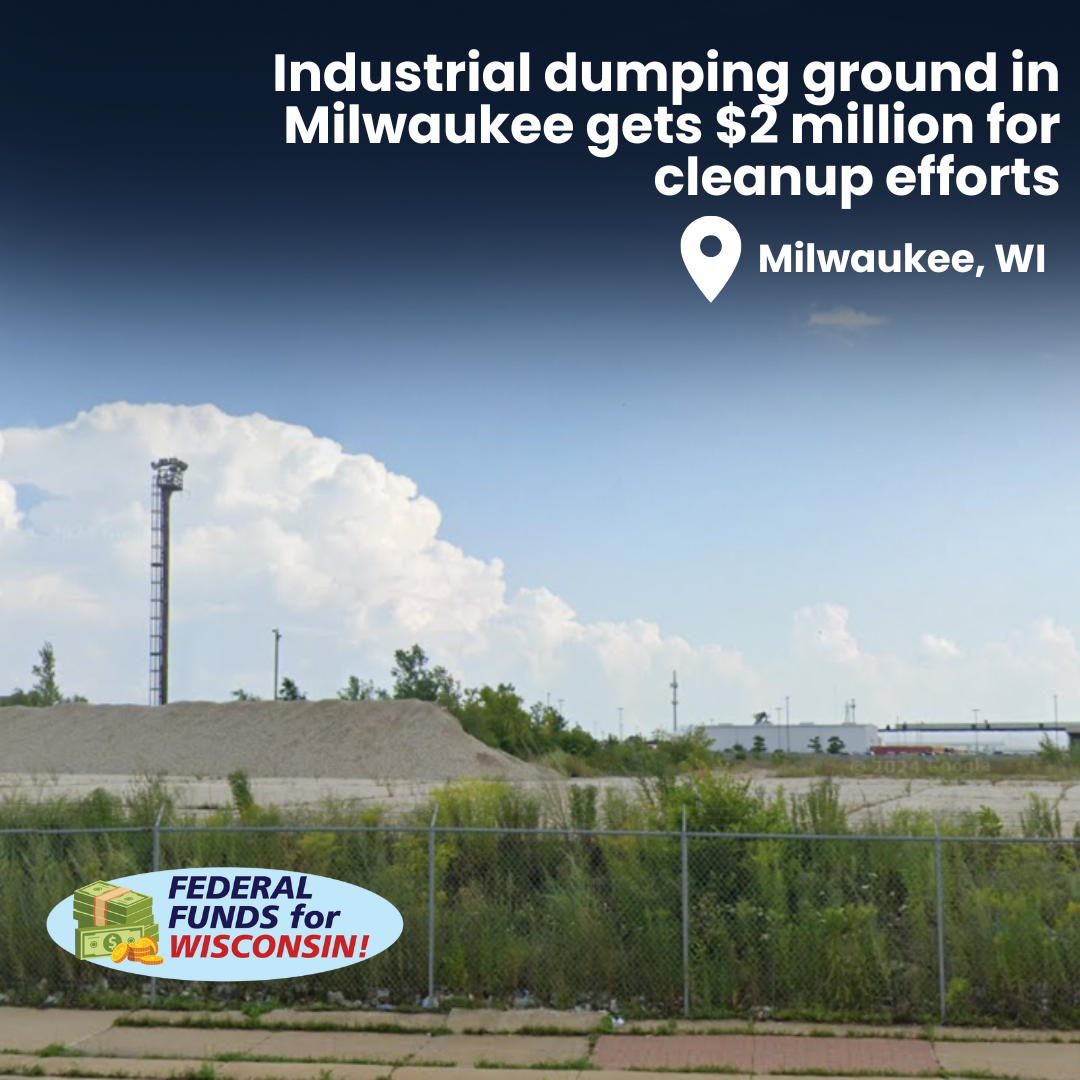
MILWAUKEE INDUSTRIAL SITE CLEANUP: The City of Milwaukee is getting $2 MILLION to clean up heavy metals, chlorinated volatile organic compounds, and polycyclic aromatic hydrocarbons from a 13.7 acre industrial site that used to house massive propane and fuel oil tanks. The site was also used to dump an industrial waste solution made up of iron and sulfuric acid.
Cleaning it up will help keep Milwaukeeans who live nearby safe from these hazardous contaminants!
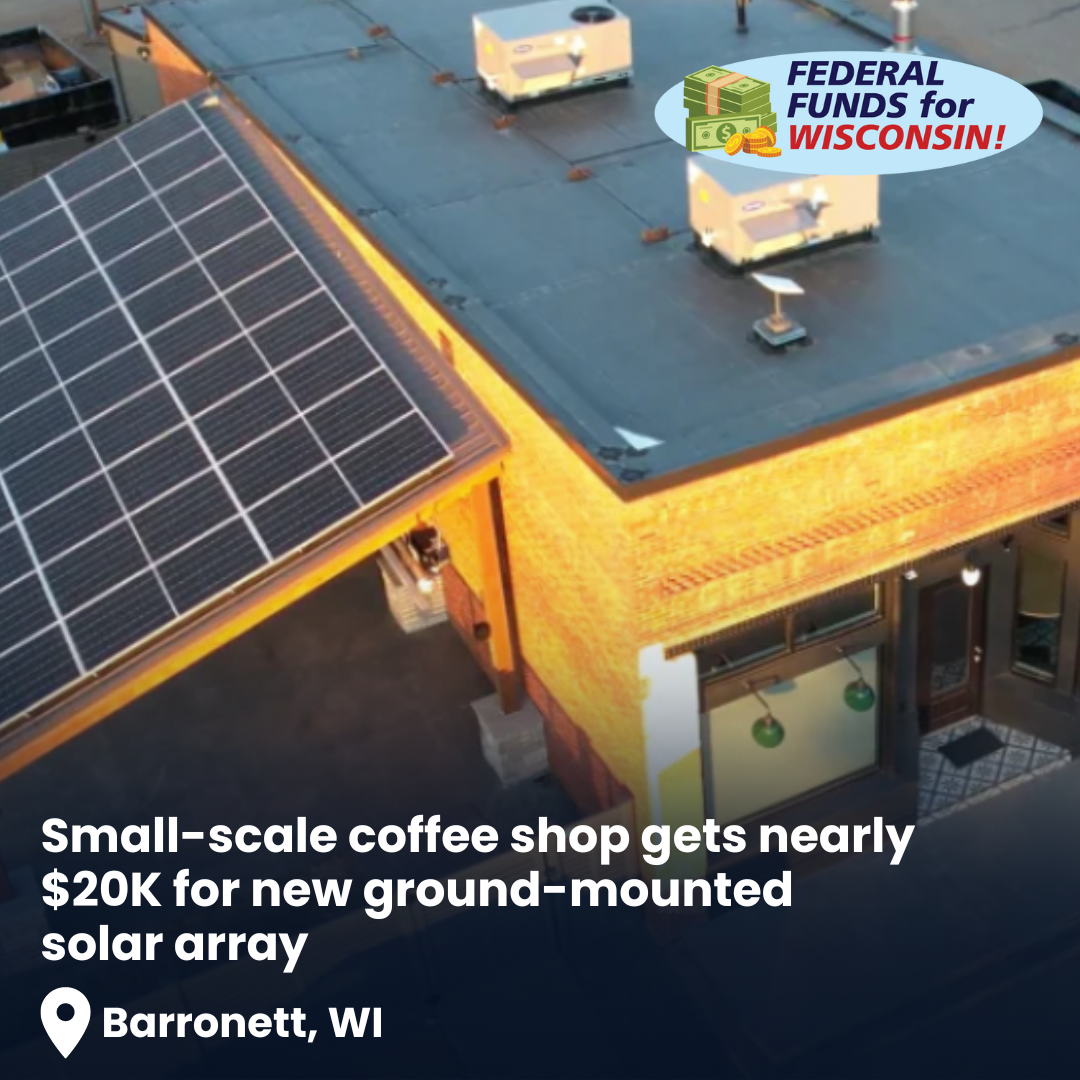
SMALL BUSINESS SOLAR: Bear Lake Coffee Co. – a small-scale coffee shop and roaster in Barronett, Wisconsin – is going all-in on sustainability! A recent $19,645 grant from the Rural Energy for America Program (REAP), which is funded by the Inflation Reduction Act, helped this northern Wisconsin business install a solar array.
Part of Bear Lake Coffee’s sustainability goal is to reach reach net-zero carbon emissions by 2030. This investment is expected to collect 18,000 kWh of power per year, helping Bear Lake Coffee to reduce their reliance on fossil fuels!
📷 : Bear Lake Coffee Co.
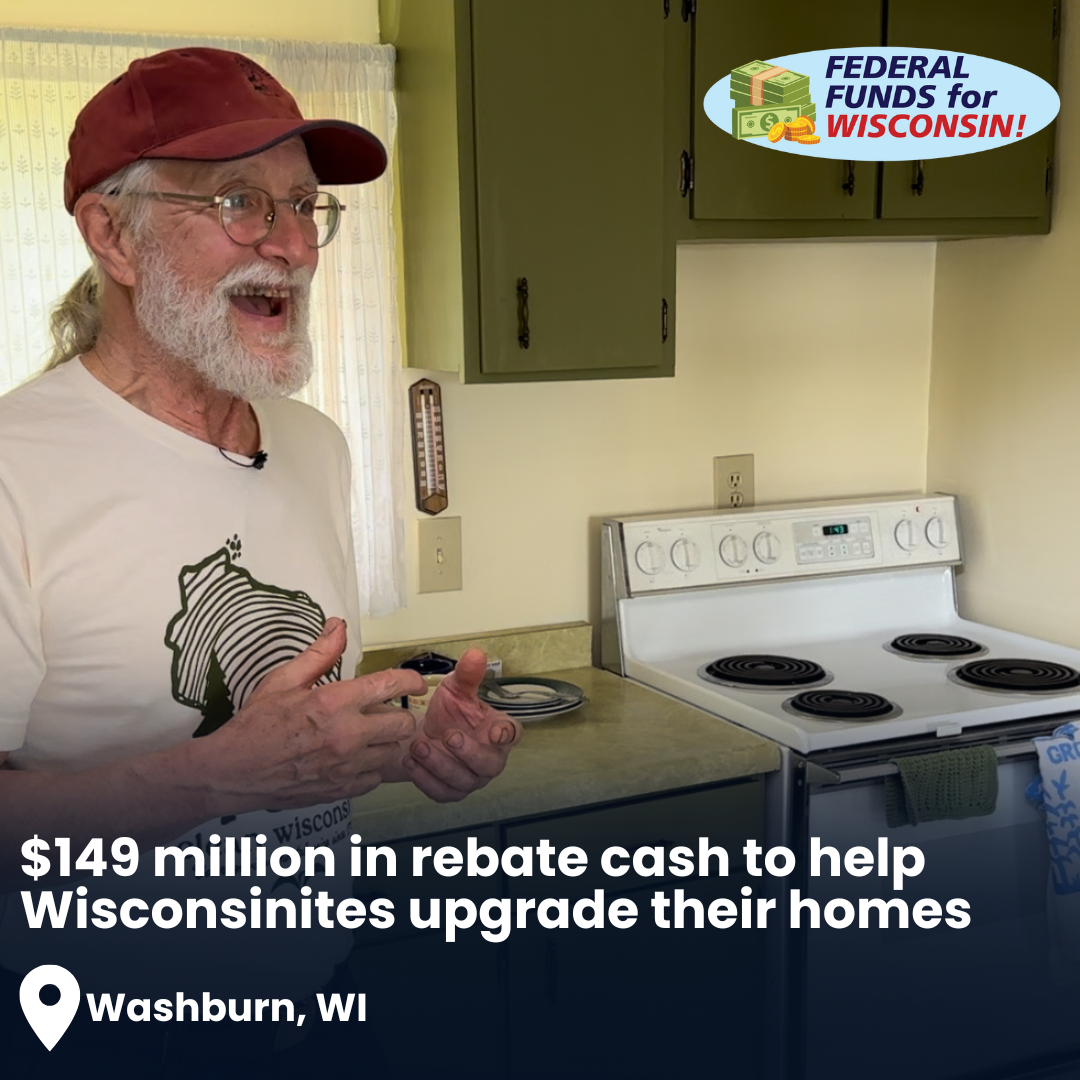
💵 COMING SOON: $149 million in rebate cash to help Wisconsinites upgrade their homes, thanks to the federal Inflation Reduction Act! Meet Chris, a low-income homeowner from Washburn, WI who’s already planning how he’ll take advantage of upcoming home energy rebates. Chris is eligible to receive **$14,000** cash back to cover the costs of his upgrades:
➡️ replacing his gas-powered water heater
➡️ installing an efficient electric heat pump
➡️ replacing his old stove top with an induction stove!
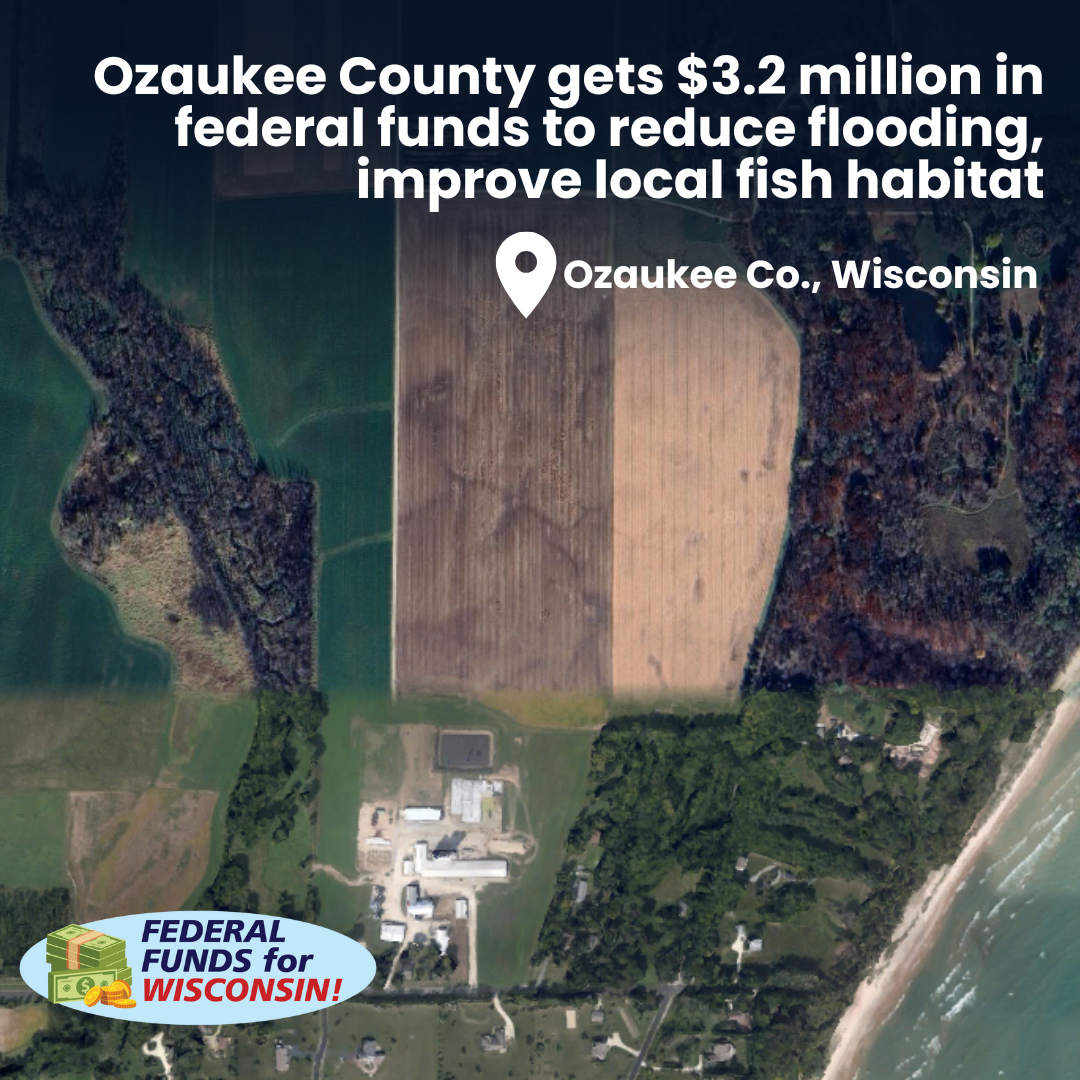
ANTI-FLOODING FUNDING: Ozaukee County is getting $3.2 million in funds from the Inflation Reduction Act and Bipartisan Infrastructure Law to reconnect Sucker Creek, a tributary of Lake Michigan, to nearby wetlands and floodplains. Not only will the project help reduce flood risks in the area, but it will also help local fish populations by expanding their habitat!

ENERGY SAVINGS AT THE VINEYARD: Raise your glass to federal funding helping Wisconsin’s small businesses! Dettmann Vineyards in Cross Plains is getting $78,000 to install a small solar array that will replace 100% of the farm’s annual energy use. That’s roughly 32,500 kWh, which is enough energy to power three homes!
Money for the project comes from the Rural Energy for America Program, which is funded by the Inflation Reduction Act.

SOLAR POWER FOR PUPS: What’s better than adorable dogs? Adorable dogs soaking up the benefits of solar energy!
Thanks to a program funded by the Inflation Reduction Act, Paws at Play Boarding and Daycare Lodge in Rice Lake is getting just over $16,000 to install a small solar array, which will cover 100% of the business’ annual energy use. Less money spent on energy means more money available to care for the dogs they look after!
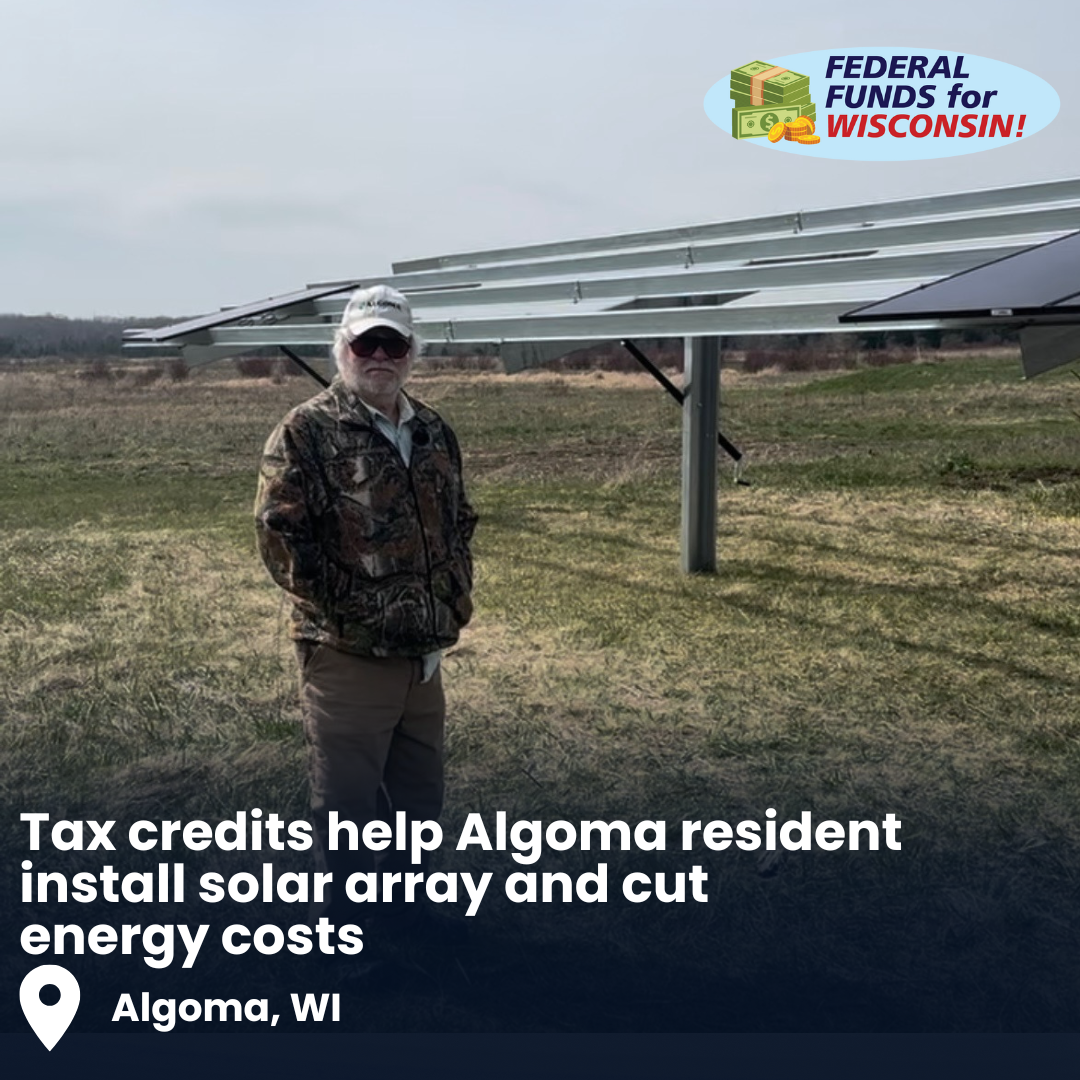
Tax credits from the Inflation Reduction Act have already helped Bruce Steinhagen install a geothermal heat pump and solar panels at his home in Algoma, WI. In August, Bruce’s energy bill for his entire home was only $2. Those are some about big savings!
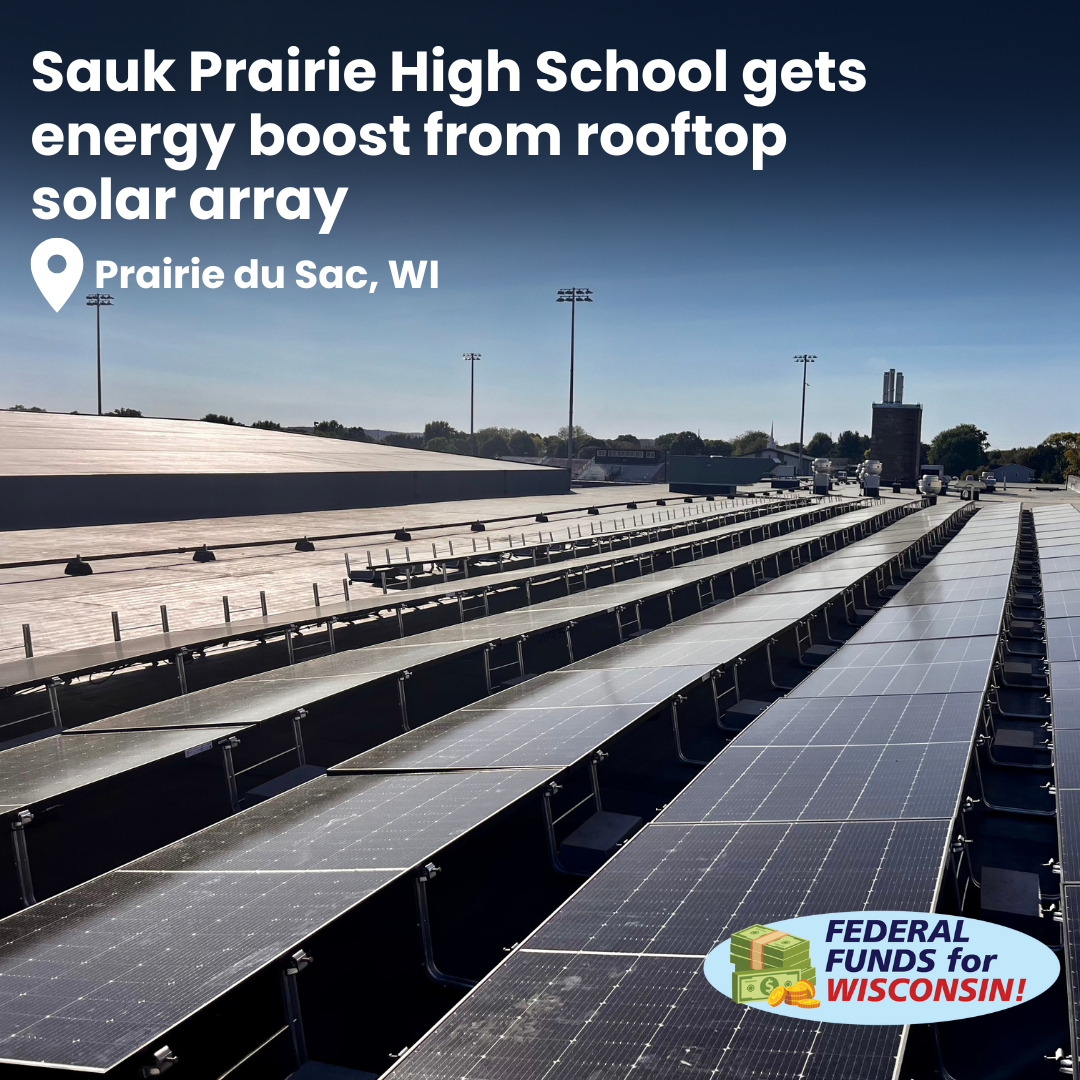
SOLAR AT SCHOOL: A brand-new rooftop solar array at Sauk Prairie High School is already saving the school district big bucks thanks in part to investments from the Inflation Reduction Act!
The school’s 150 kW rooftop array, which started running earlier this fall, generates enough energy to offset 100% of the energy needs for the school’s River Arts Center! The school district plans to install a solar array on Bridges Elementary next, which will help the district save even more money in the future.
📷: Sauk Prairie School District
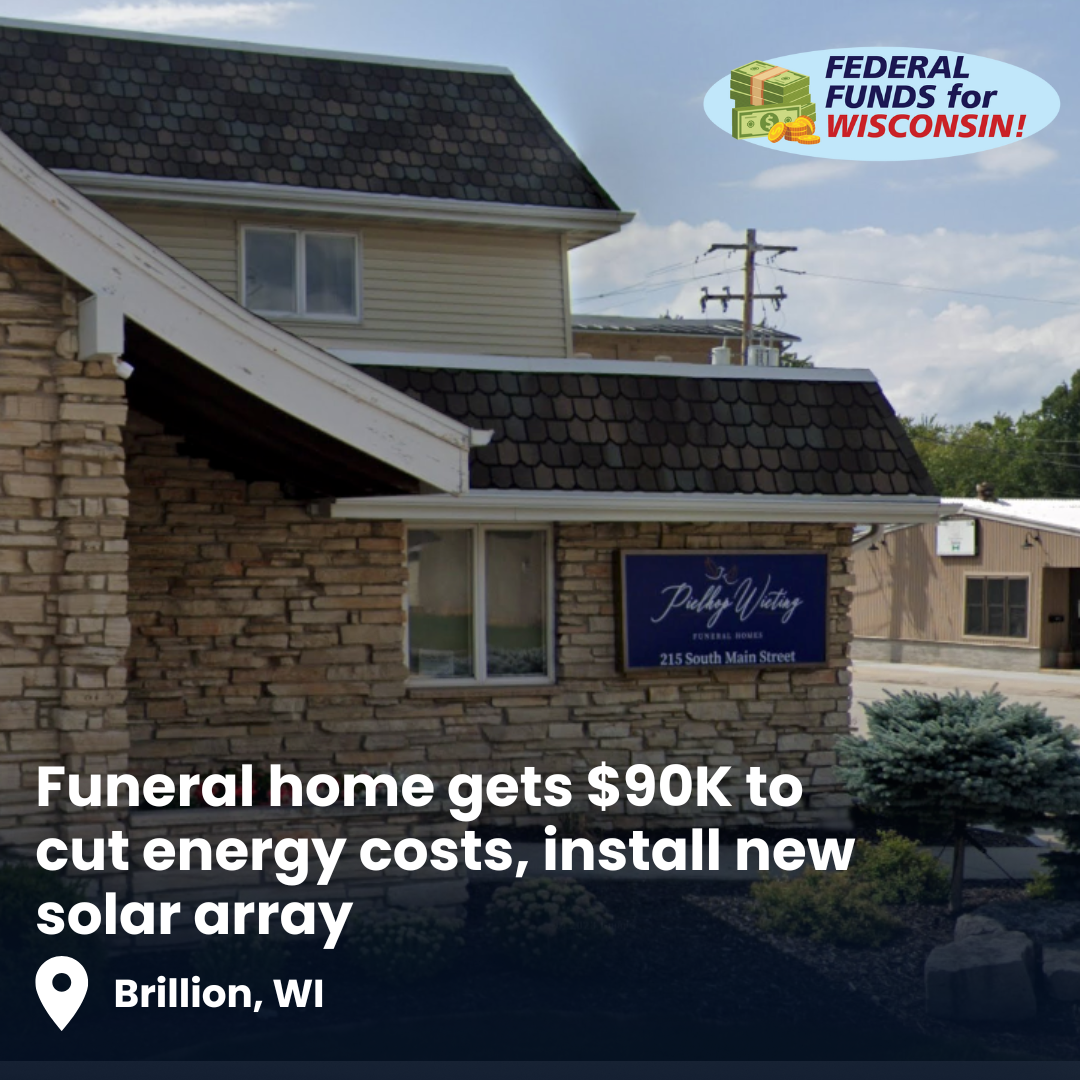
CUTTING COSTS AND ENERGY: The Inflation Reduction Act is helping businesses like Pielhop Wieting Funeral Homes invest in their futures while making major savings along the way!
A combined $90K from the Rural Energy for America Program, which is funded by the IRA, will help the business upgrade to more efficient heating, ventilation and cooling systems, install more efficient windows and doors, and install a small solar array that will cover nearly three quarters of the business’ annual energy use!
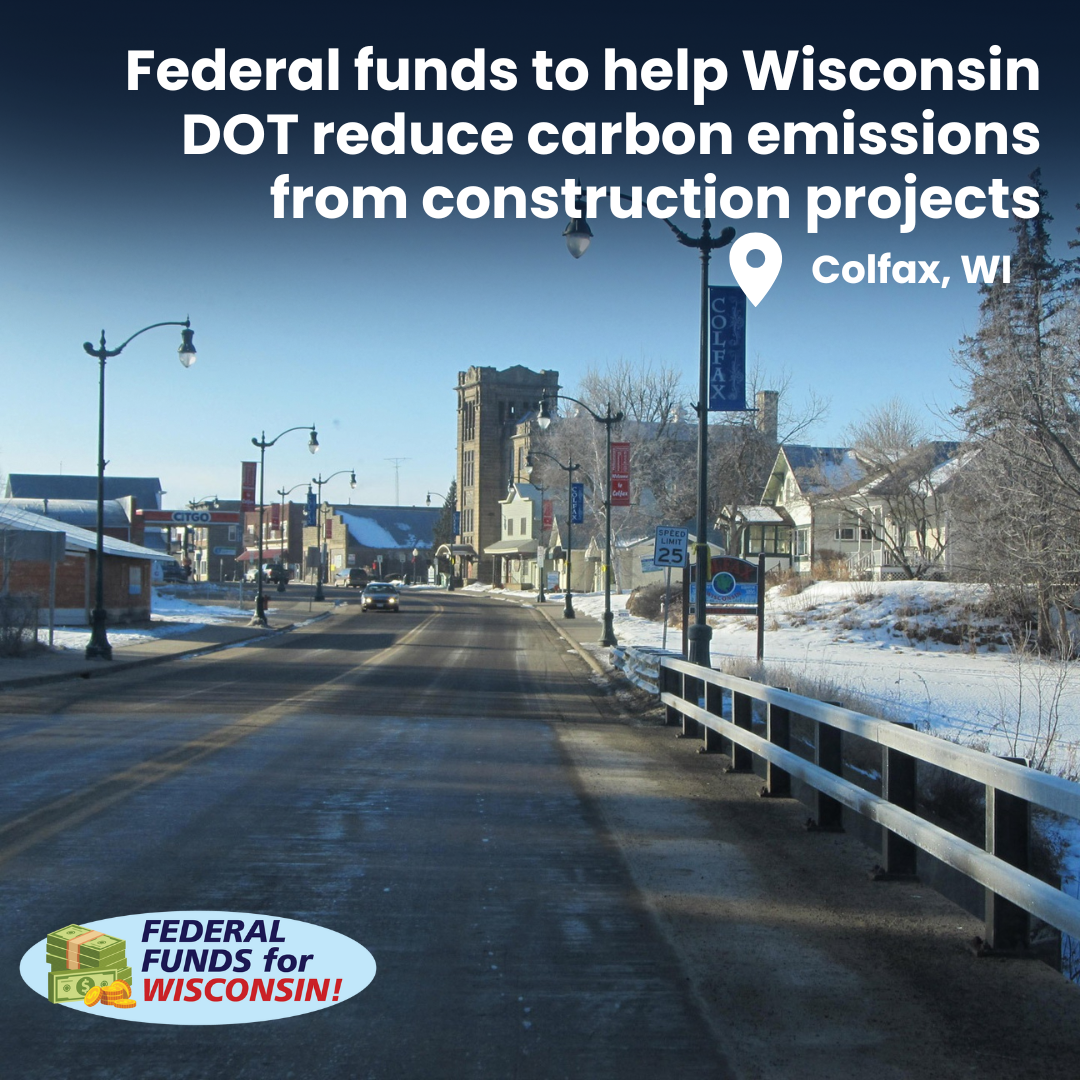
CUTTING DOWN CARBON EMISSIONS: Wisconsin’s cold weather means our roads need repairs year after year, and that construction usually means using building materials that can harm our climate.
That’s why the Wisconsin Department of Transportation is taking advantage of $32 million in funds from the Inflation Reduction Act to create a program that will look for ways to reduce carbon emissions from transportation improvement projects! The project will focus on promoting materials that produce fewer greenhouse gases and are more sustainable in the long run.
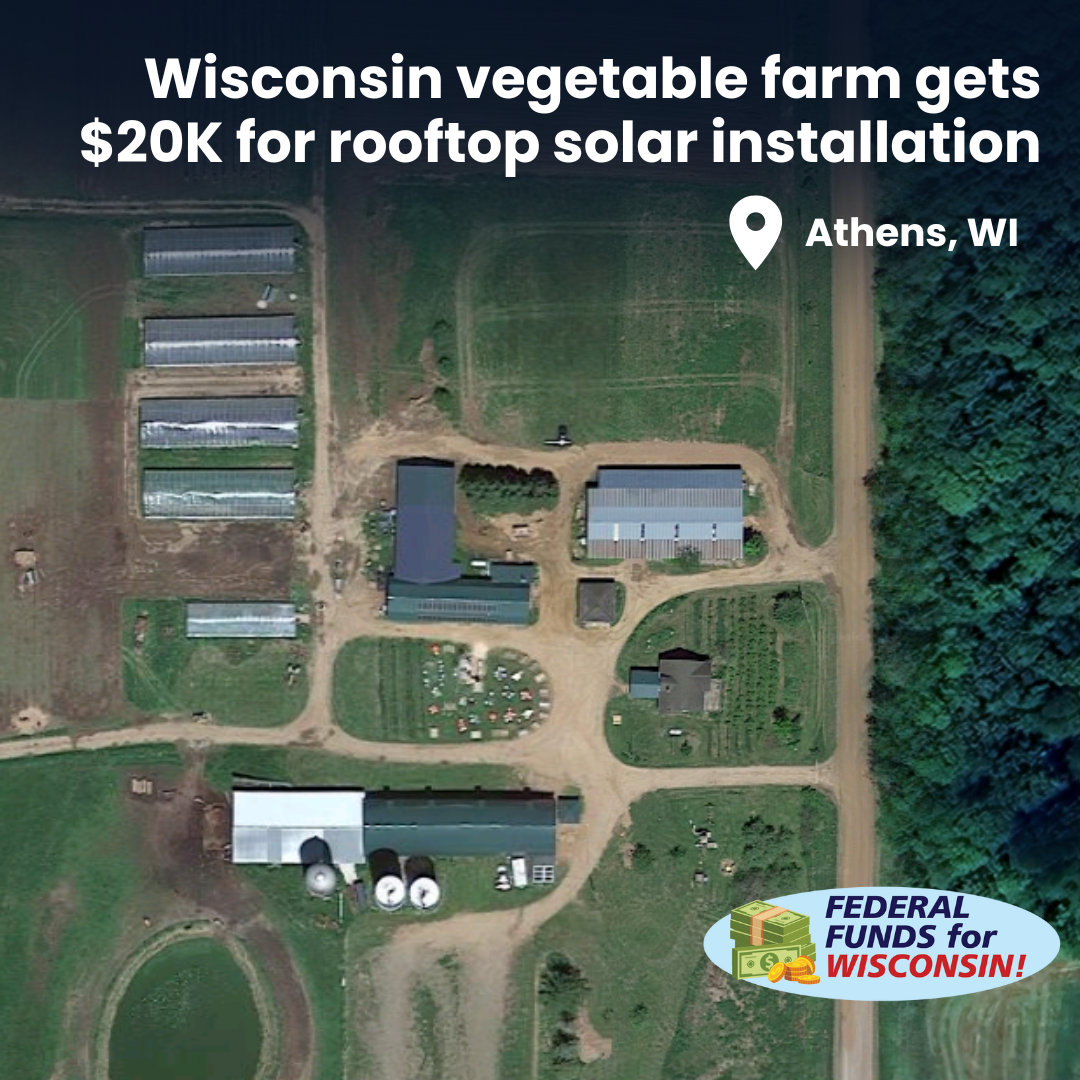
SAVING AND GROWING GREENS: A $20K grant funded by the Inflation Reduction Act is helping a Wisconsin vegetable farm save money while cutting energy expenses in half! Stoney Acres Farm near Athens used money from the IRA to install a roof-mounted solar array, which will save the operation thousands of dollars each year.
Wisconsinites all over the state are saving big thanks to historic investments in energy and efficiency upgrades for businesses and homes alike.
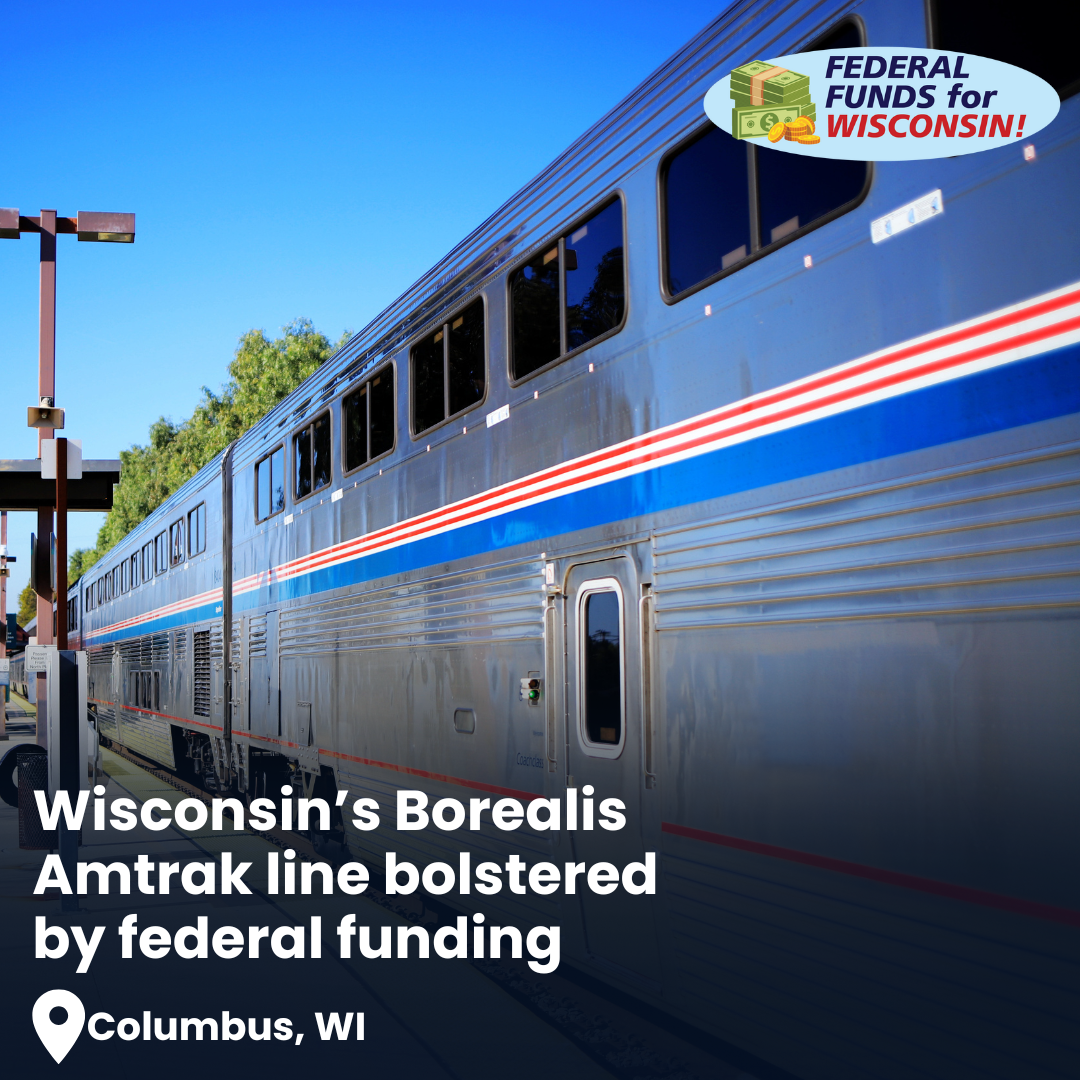
FUNDING BOOST FOR BOREALIS: Amtrak’s Borealis commuter rail line is getting more than $38.6 million to expand service for the route, which connects Wisconsinites to Minneapolis and Chicago! Money for the new service rollouts comes in part from the Bipartisan Infrastructure Law.
With stops in seven Wisconsin cities — Sturtevant, Milwaukee, Columbus, Portage, the Wisconsin Dells, Tomah, and La Crosse — the Borealis line makes it easy and affordable for countless Wisconsinites to explore the state while eliminating the carbon emissions that come with driving.
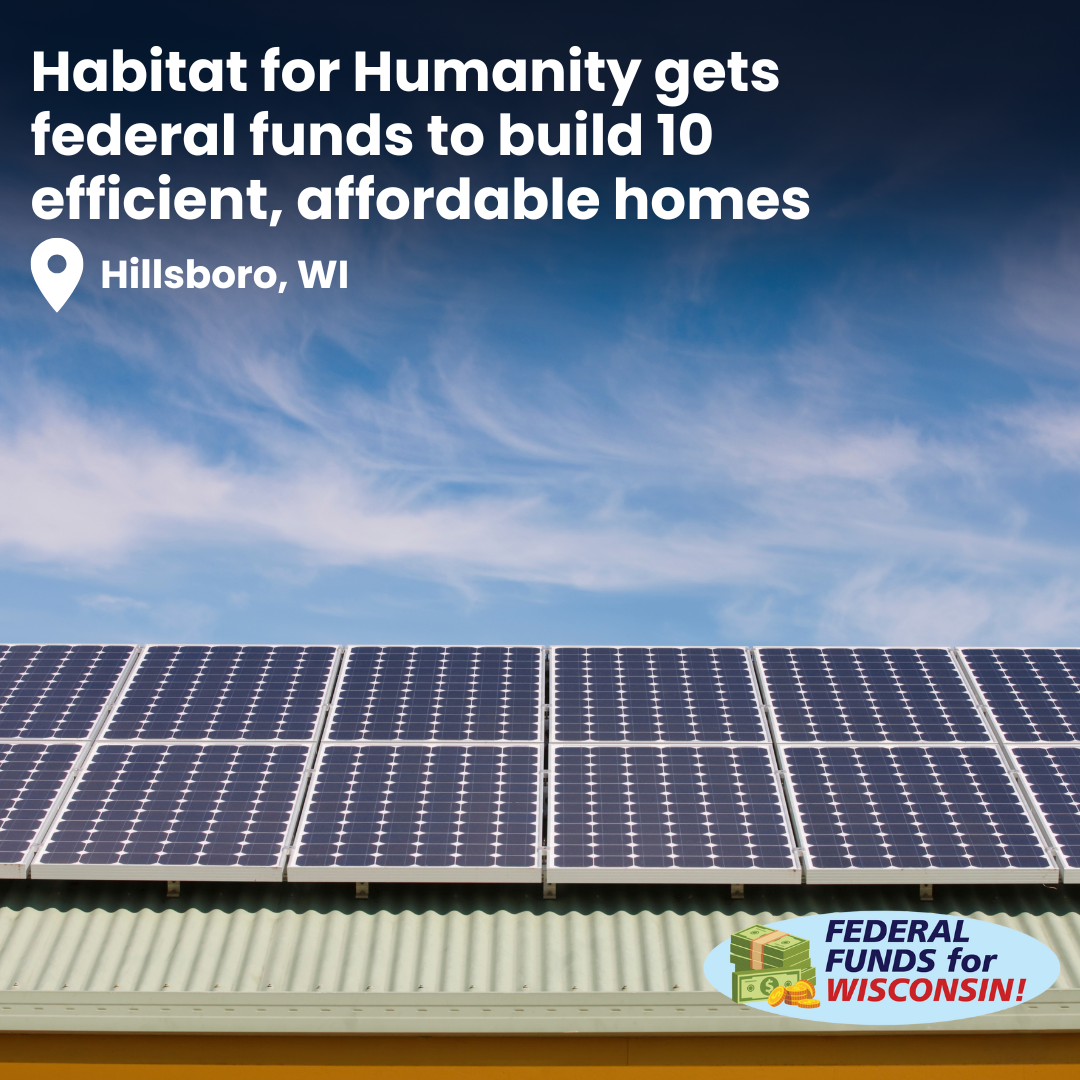
NEW HOMES IN HIlLSBORO: Habitat for Humanity of the Greater La Crosse Region is building 10 new affordable homes in Hillsboro thanks to funding from the Bipartisan Infrastructure Law! These homes will have solar panels and battery backups, which will not only help reduce carbon emissions, but also keep costs low and affordable for residents for years to come.
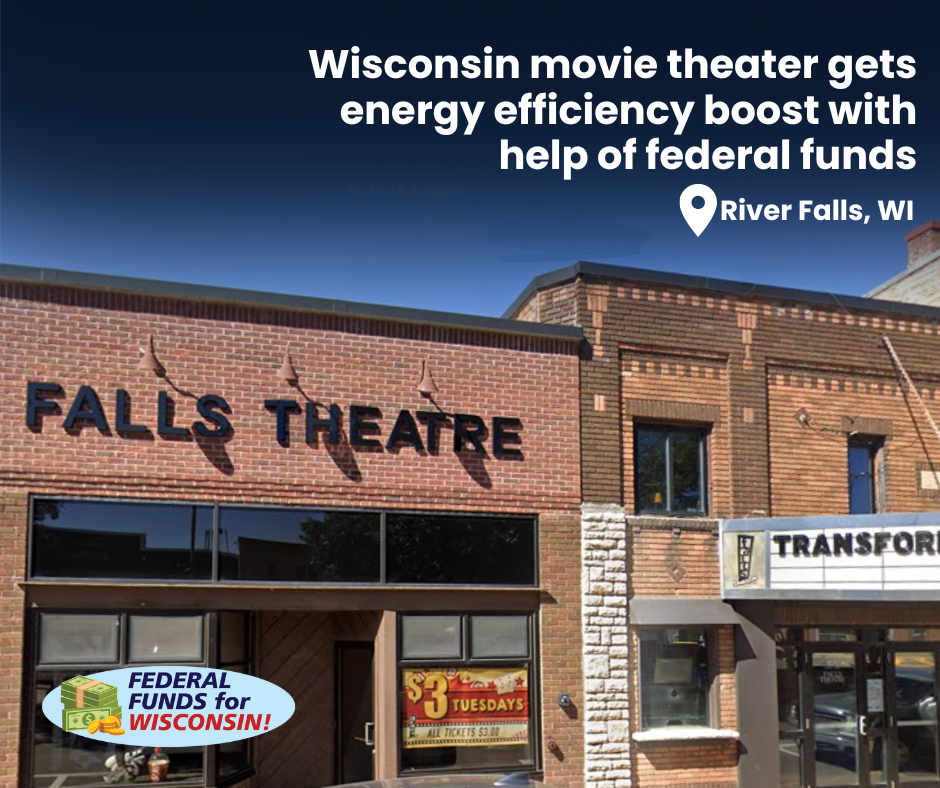
MORE EFFICIENT MOVIES: Investments from the Inflation Reduction Act are helping the historic Falls Theatre install more efficient heating, ventilation and a/c equipment, which will help the small River Falls business save thousands of dollars on energy use every year.
The theater is getting a $37,150 grant from the Rural Energy for America Program, which is funded by the IRA. Investments like these are transforming communities all over Wisconsin!

SOLAR-POWER SEED SUPPLY: GRO Alliance, a seed supplier in Cuba City, is getting $438,500 for a roof-mounted solar array that will save the company more than $45,000 in energy costs every year.
Money for the project come from the Rural Energy for America Program, which is funded by the Inflation Reduction Act.

REPAIRING WISCONSIN ROADS: Nearly 40 miles of road in northern Wisconsin are getting some needed repairs and upgrades thanks to $25 million in funding from the Bipartisan Infrastructure Law!
Highway 47 and Highway 55 help outdoor enthusiasts access some of Wisconsin’s most precious natural spaces, but they’re in need of serious maintenance. Fixing up these roads means more Wisconsinites will have easier and safer access to the natural spaces we treasure so much.
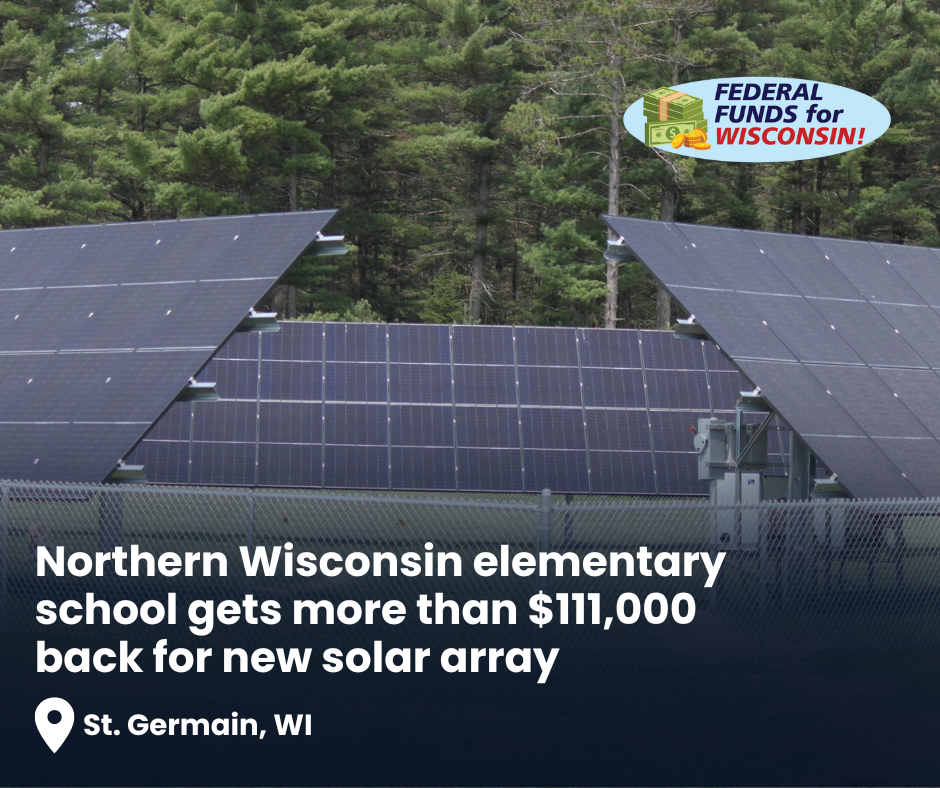
ST. GERMAIN SUPPORTING SOLAR: A new solar array at St. Germain Elementary School in northern Wisconsin is giving students hands-on opportunities to learn about electricity while their school saves big on energy costs, and it was all made possible through the Inflation Reduction Act.
The school’s new solar array is the fourth in Northland Pines School District and the first to get an energy tax credit. In late 2024 the district got a whopping $111,375 back from the federal government thanks to tax credits included in the IRA.
📷: Northland Pines School District
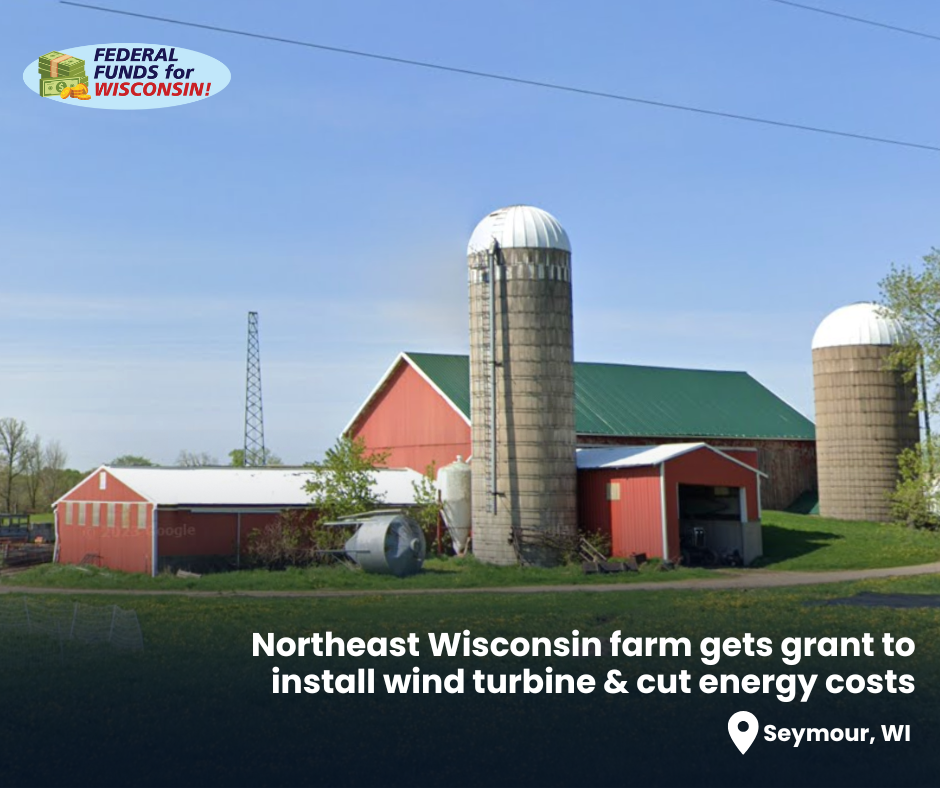
FUNDS FOR FARMERS: Farmers all over Wisconsin are benefiting from investments from the federal government, including Full Circle Community Farm (@fullcirclecommunityfarm)! The farm plans to use a $40,850 grant from the Rural Energy for America Program to install a new wind turbine, which will save them $8,000 a year in electrical costs!
Investments made possible by the Inflation Reduction Act and Bipartisan Infrastructure Law are under attack, meaning small farms like Full Circle Community Farm could lose access to transformative programs that are helping Wisconsinites save money and energy.
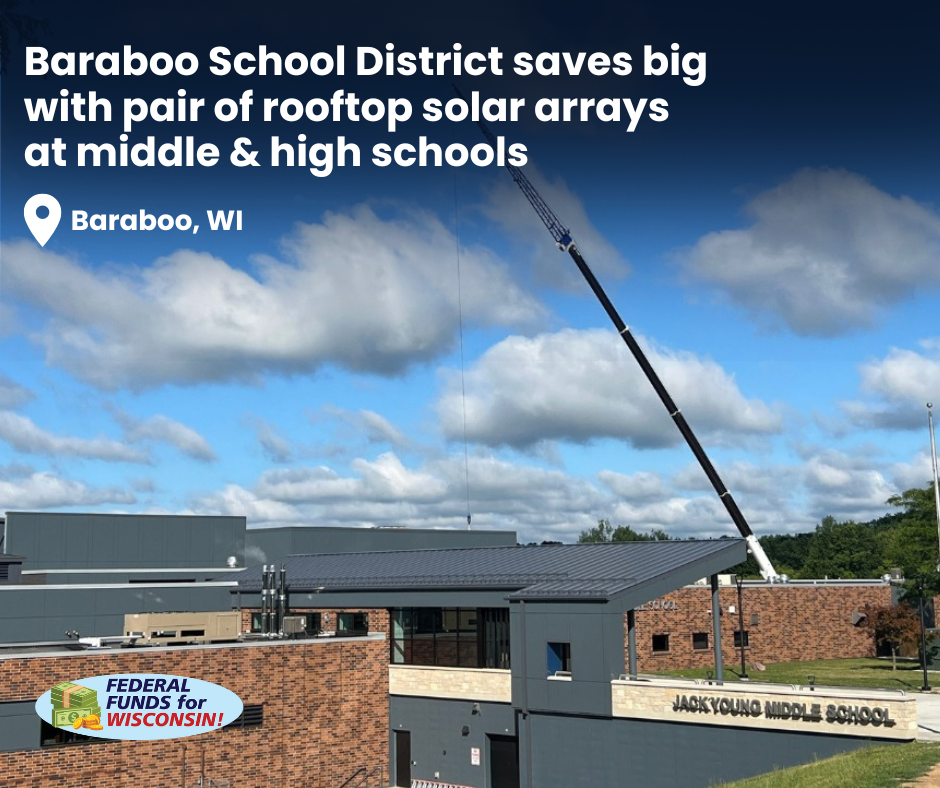
SAVING BIG WITH SOLAR: The Baraboo School District is saving big thanks to tax credits and investments made possible by the Inflation Reduction Act. After just one year in operation, the district’s two solar arrays — one at Jack Young Middle School and another at Baraboo High School — saved the district $44,000 in utility bill expenses! What’s more? The district also got a $153,817 reimbursement for the project late last year, meaning even more savings and opportunities to invest in our children’s futures.
Projects like these are transforming Wisconsinites’ lives for the better, freeing up resources to invest in our communities in ways that was previously impossible.
📷: Baraboo School District
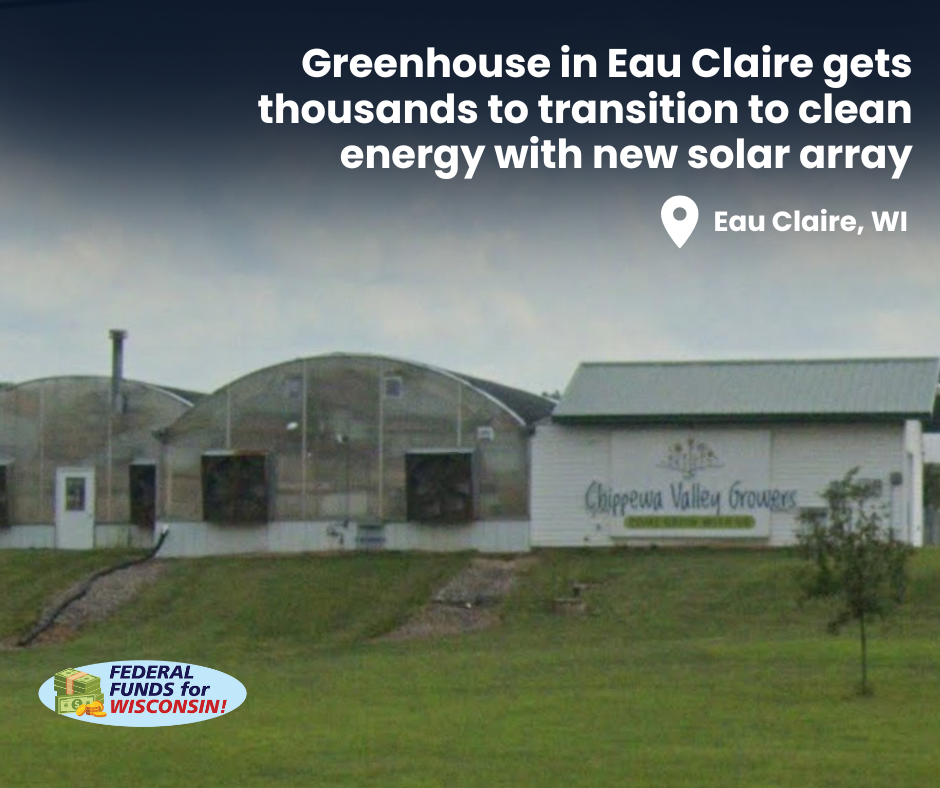
GREENHOUSE GOES CLEAN: Chippewa Valley Growers, a locally owned greenhouse in Eau Claire County, is joining the clean energy transition thanks to a $58,400 grant from the Rural Energy for America Program, funded by the Inflation Reduction Act! The money will go toward installing a small solar array that will save the business more than $6,000 in energy costs each year while replacing enough energy to power five Wisconsin homes!
Small businesses and communities in every corner of the state are benefiting thanks to investments made possible by the Inflation Reduction Act and Bipartisan Infrastructure Law.